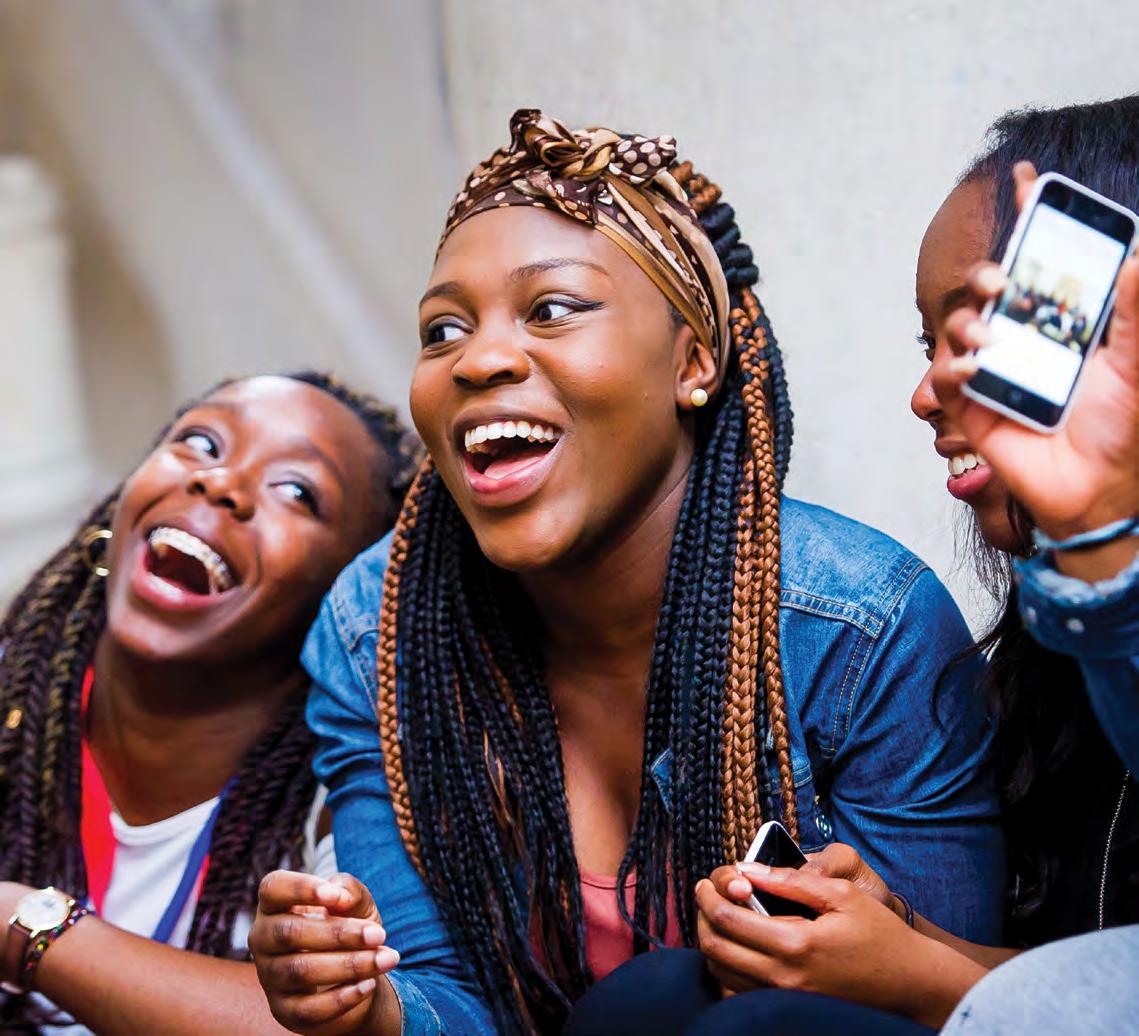
Widening Participation Department Yearbook 2017

Welcome Welcome 03 Progress and achievements 04 Programmes and activities King’s Scholars 08 G ameplan 10 K+ 12 Realising Opportunities 14 Sutton Trust Summer School 15 O utreach for Dentistry 16 O utreach for Medicine 17 C are leavers 18 Gypsies, Roma and Travellers 19 Forced migrants 19 Success at university Behavioural Insights in Higher Education 22 M ature learners 23 S tudy abroad 24 Students supporting the next generation 25 Partnerships Parent Power 28 K ing’s Advocate Award 30 S chool Governor Network 32 K ing’s College London Mathematics School 33 Academic case study 3 4 IntoUniversity 35 T he Brilliant Club 36 O utreach in Wales 37 BA ME outreach 37 Penguin Random House 38 O pportunities to get involved 39 Acknowledgements Partners 40 Key supporters 41 Meet the team 42 Contents
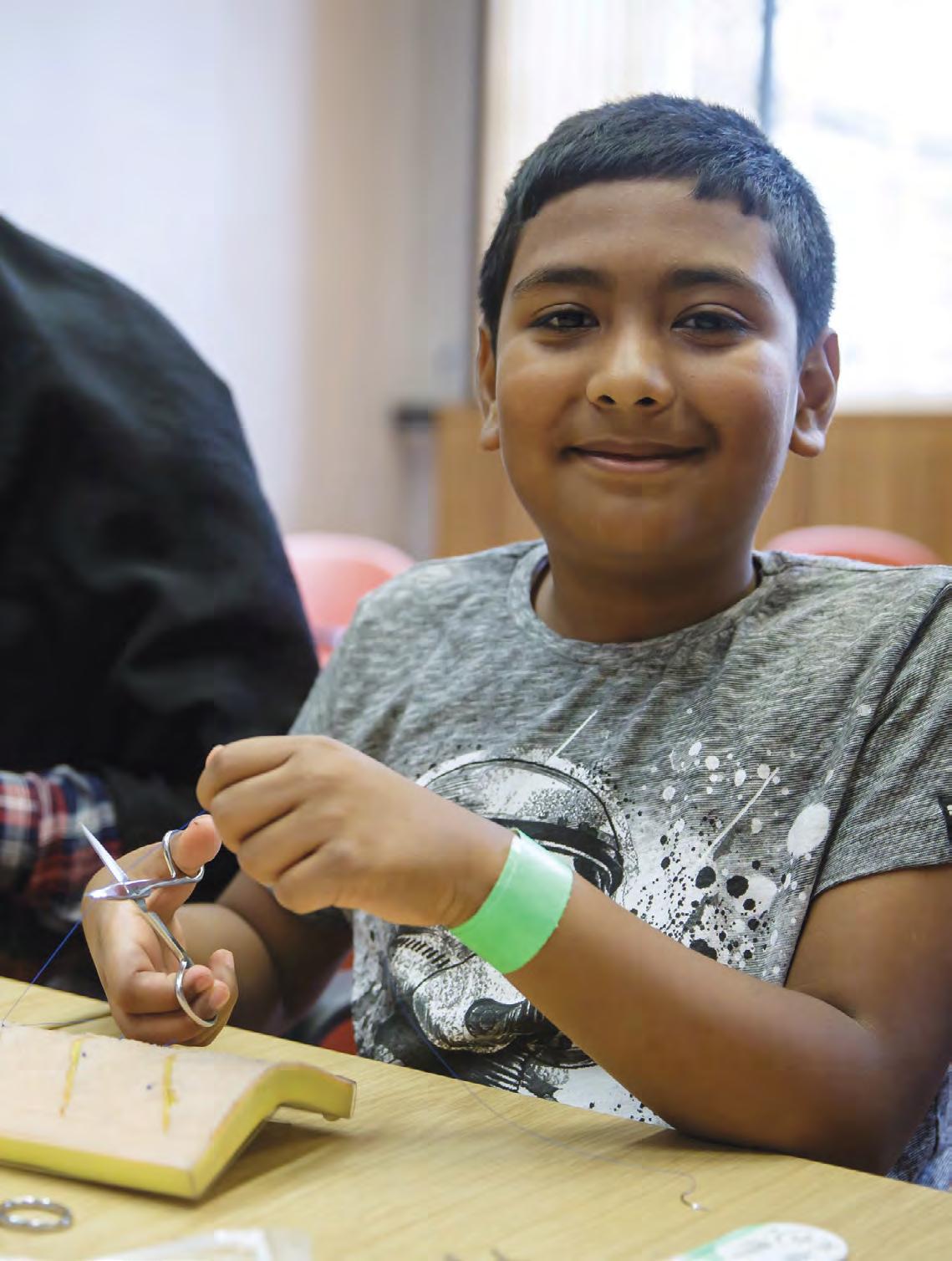
1
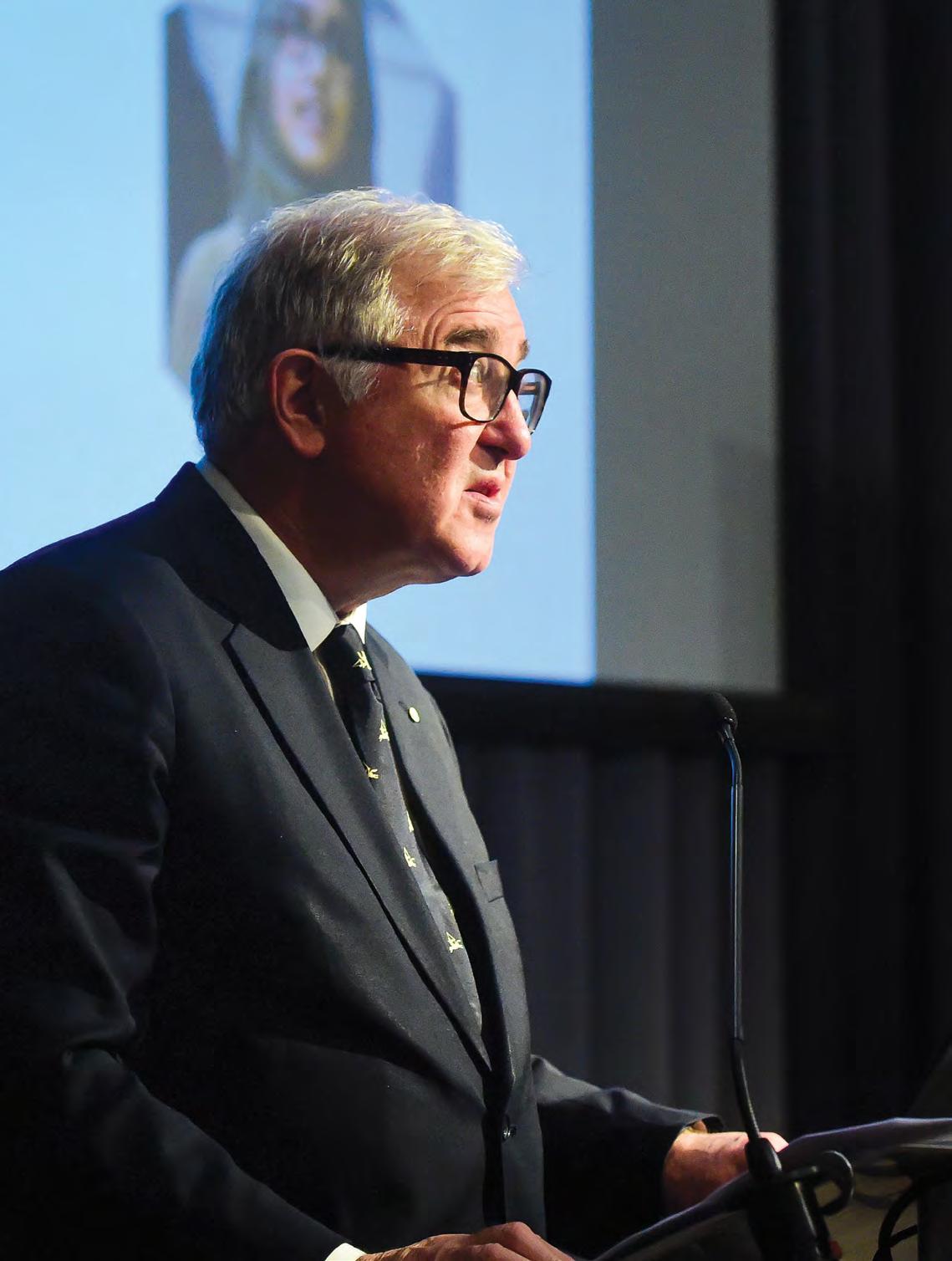
2
King’s College London has been making the world a better place for almost 200 years. Since our foundation in 1829, King’s students and staff have dedicated themselves to the service of society.
Every day I’m inspired by the people I meet at King’s. Our community is made of people from a broad range of backgrounds, nationalities and viewpoints. As a result, King’s represents a diversity of thought and expression which places us in an ideal position to impact society. We are already one of the top 25 universities in the world, but my hope is that King’s success will reach beyond international league tables, and we will become the leading university for social mobility. This is a core part of our Vision 2029 strategy.
King’s is not only interested in students who can achieve top grades, but also those who are passionate about contributing to their community and society at large. We are committed to ensuring that the best students can come to King’s, regardless of their background. I am proud of the work the Widening Participation Department is doing to make this vision a reality. Through programmes like King’s Scholars and K+, we are able to engage with the next generation of thinkers and change makers, supporting them to achieve their goals and make the world a better place.
It is no surprise to me that under the steerage of Anne-Marie Canning, the team has been recognised for their work and honoured with a place on the shortlist for the Times Higher Education Award for Widening Participation Initiative of the Year.
As we approach the 200th anniversary of our world leading university, I am reminded that it is our deeds that define us. There has never been a more important time in modern history for great universities to make a full contribution to society. Together we will continue to engage with the capital’s challenges and opportunities. I hope you will join us in making the world a better place by supporting widening participation at our university.
President & Principal, Professor Edward Byrne AC
3 Welcome
124 students from our intensive outreach programmes* started at King’s in 2017
*Intensive programmes include K+, Realising Opportunities, Sutton Trust Summer School and individually supported care leavers
74% of those students belong to financially stretched and urban adversity economic groups according to ACORN classification
We are increasing the number of successful applications to King’s College London from under-represented groups
359 sixth-form students on our intensive outreach programmes granted access to King’s libraries
35 first-year university students from widening participation backgrounds participated in the bespoke induction
We are equipping secondary school and sixth form students with skills to transition to Higher Education
4
Progress and achievements
We have engaged
13,183 students and advisors in outreach activity in 2016–17
56 King’s Advocates participated in a year-long training programme
182 delegates attended the Brilliant Club conference
We are equipping advisors and influencers with the information and tools to support learners from under-represented backgrounds into higher education
665 school pupils attended King’s in partnership with the Brilliant Club in 2016–17
1,453 school pupils attended King’s in partnership with IntoUniversity in 2016–17
We are providing learners with the information to make well-informed and aspirational decisions about their progression to higher education
18 project grants led by King’s academics and professional services staff were funded in 2016–17
44 members of King’s staff served as school governors and engaged with the King’s network
We are enabling staff members to support widening participation activity across all departments in King’s College London
5
Programmes and activities
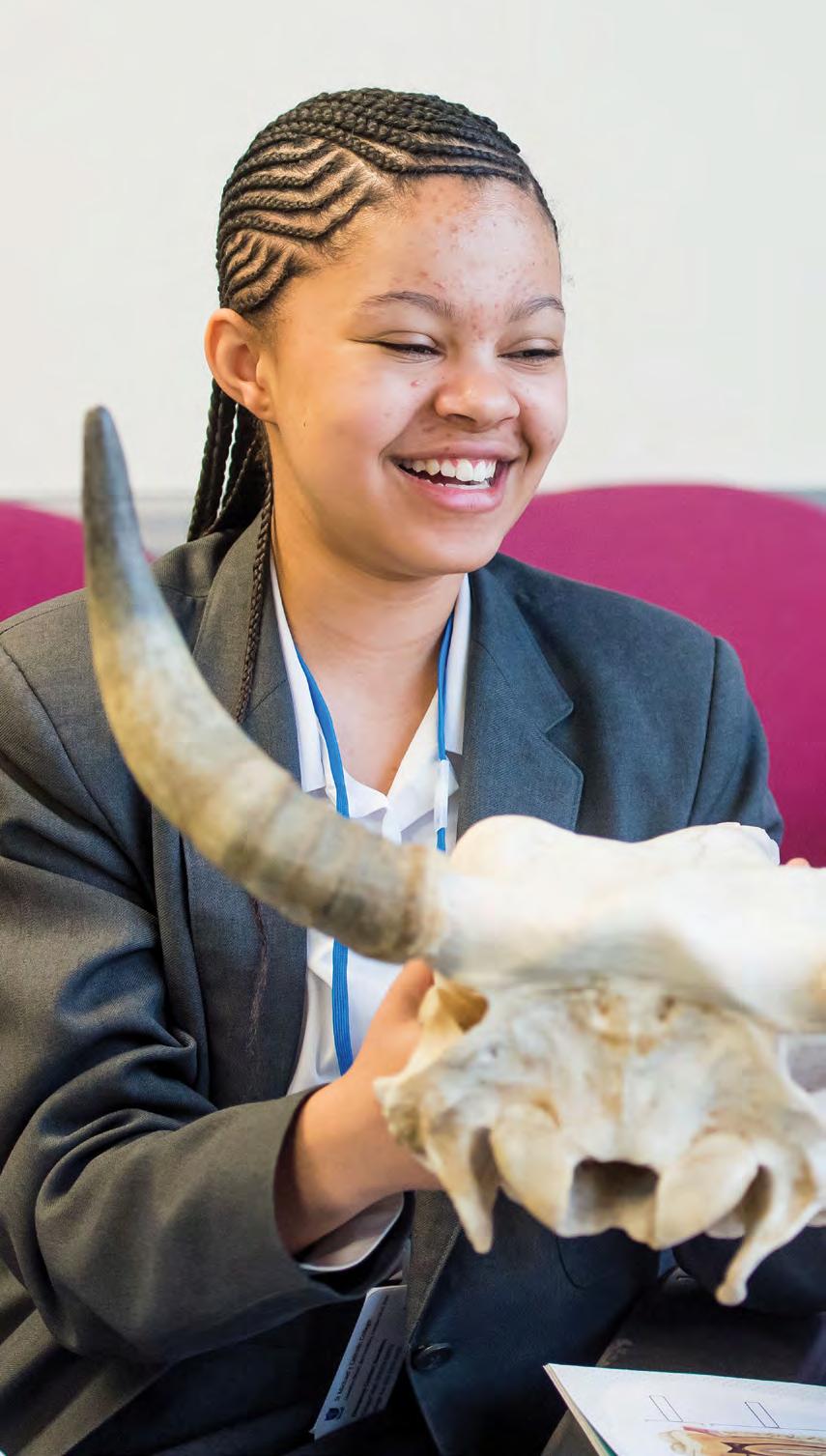
6
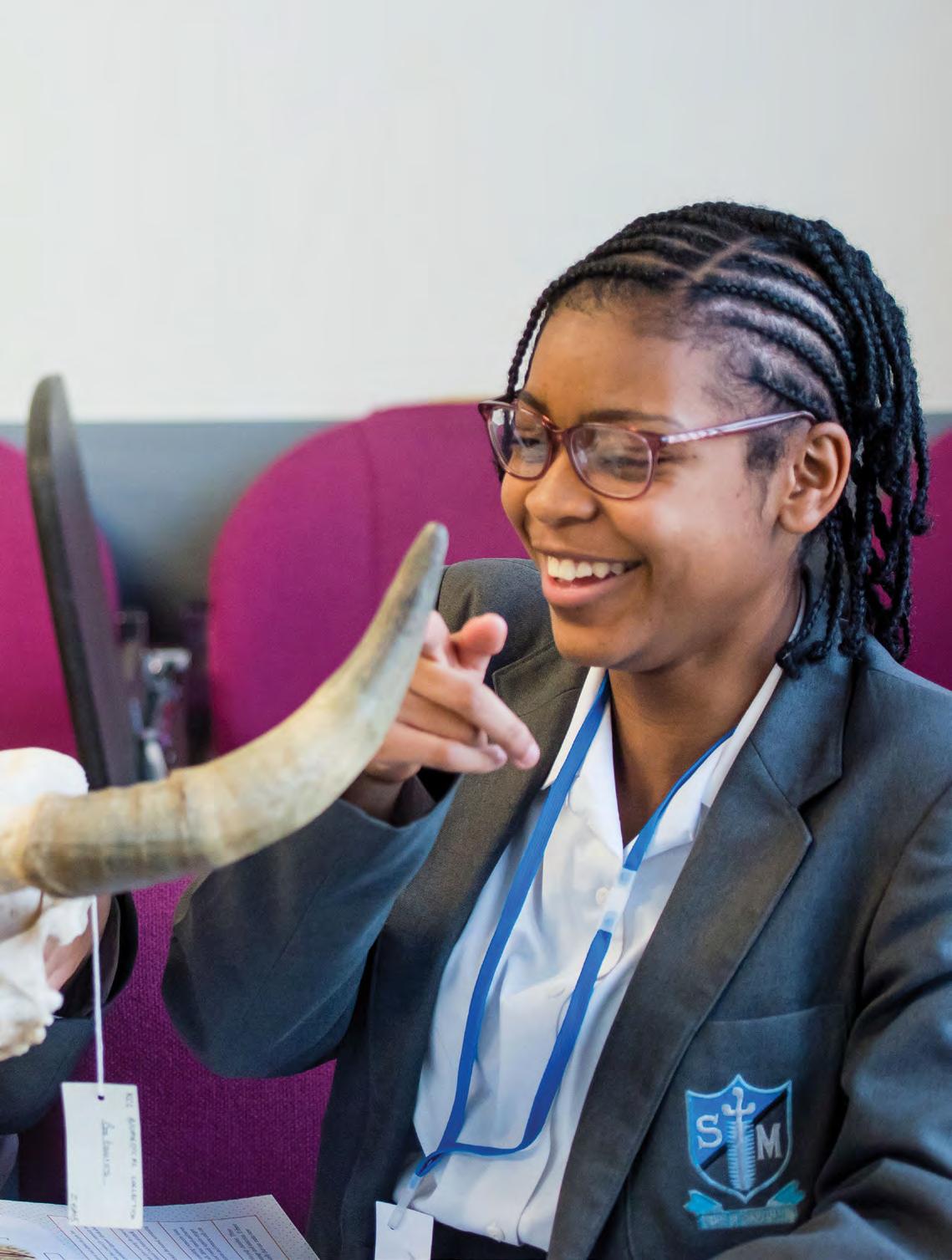
7
King’s Scholars
Founded in July 2015, King’s Scholars works with under-represented Year 7 to 9 pupils from 13 local schools in Lambeth, Southwark and Westminster. Our first cohort of 284 pupils have just completed their second year of the scheme, closely followed by our second cohort of 315 pupils who have finished their first year.
The programme encourages pupils from traditionally under-represented backgrounds to apply to, and succeed at, highly selective universities. Accordingly, much of the scheme is focused on raising the attainment of these pupils, providing information and guidance on how to progress to higher education, and engaging parents in pupils’ education.

Central to the programme is the teaching of metacognition. Throughout every King’s Scholars activity, pupils are equipped with our recently developed ‘King’s Scholar’ skills, a set of metacognitive skills designed to boost in-school attainment.
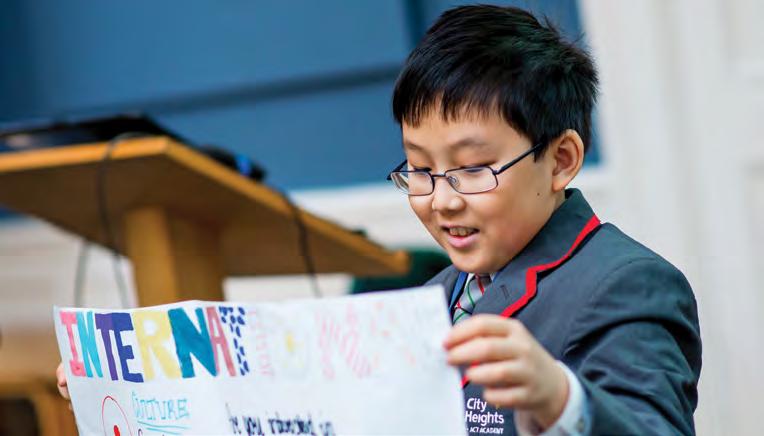
More precisely, the programme is split into three years. Year 7 provides an introduction to university. A campus activity day is followed by a six-week course of in-school study skills sessions, delivered by King’s students. The year then concludes with our King’s Scholars Family Day, which welcomes Scholars and
‘I found Spring Up School excellent because it allowed me to explore subjects that I don’t learn about in school. For example, dentistry, when I first found out I was doing dentistry, I wasn’t excited. However, I really enjoyed studying it. Furthermore, I really enjoyed the inspirational speakers this week.’
8
A Year 8 King’s Scholar following Spring Up School
their families to our Strand Campus for a day of pupil subject workshops and parental training sessions.
Year 8 then offers pupils the opportunity to explore and enjoy a vast array of subjects. Through our Design a University Day, the Subject Love Letter competition, and our Spring Up four-day subject exploration school, King’s Scholars have the chance to immerse themselves in new, exciting and engaging university subjects. Meanwhile, parents are invited to our Parents’ Tea Party, offering them information and guidance alongside a chance to network with other families and university staff.
Once this subject exploration is complete, Year 9 offers careers and qualification guidance, alongside sessions that will prepare pupils for GCSEs. Following a top-up day of study skills in September, King’s Scholars receive a six week in-school course on career choices delivered by King’s student ambassadors. An on-campus careers day follows before families are invited to join us to see King’s Scholars graduate from the programme.
From 2017–18, in partnership with the Behavioural Insights Team, the scheme will be evaluated using a randomised control trial in order to ascertain the impact of metacognition skills on King’s Scholars pupils.
‘My son has just completed the first year of the King’s Scholars scheme, and already I can see a difference. Whenever he visits King’s he returns home so pumped up. The events drive him to start asking where he wants to study, what he wants to study, why he wants to study, and better still, he now knows that he can get there.’
Betty Iziku, King’s Scholars Parent
‘Harris Academy Girls East Dulwich has taken part in the King’s Scholars Scheme since it was founded. This has enabled our pupils to experience a leading university and meet and talk to current students. They have responded brilliantly to the chance to develop their skills and approach to learning. The ambassadors have been fantastic, and our pupils have responded superbly to the guidance and encouragement they have received.’
Chris Brown, Wider Opportunities Coordinator, Harris Academy Girls East Dulwich
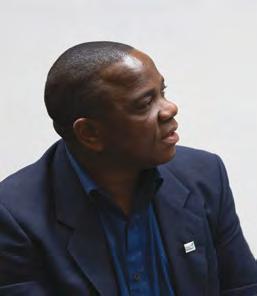

PROGRESS AND ACHIEVEMENTS
PUPILS
100 %
in King’s Scholars cohort 2 either receive the pupil premium or live in Acorn 4 to 5 postcodes
TEACHERS
100 %
who attended Design a University Day asserted that King’s Scholars have learned new study skills and that these skills will raise their attainment
Family Day
215 parents, children and family members attended Family Day 2017
PARENTS
96 % who attended Family Day 2017 would change the way that they supported their child as a result of the training
9
Gameplan
Launched in March 2017, gameplan.ac.uk is a free games-based website that allows 10 to 14-year-olds and their parents to explore university.
Using games, videos and animations, the site offers pupils interactive advice and guidance on how to access top universities. Designed to be used either in short school sessions as a stand-alone site, or in a more structured lesson-based format with accompanying lesson plans, the site can be accessed both at home and at school. Parents too are provided with a wide range of information, expert advice and crucial hints and tips, enabling them to effectively support their child.
In the first five months after launching, the site has been visited over 27,000 times in schools and homes across the UK. Gameplan has partnered with five multi-academy trusts across the UK who promote Gameplan to
their Key Stage 2 and 3 learners through the Gameplan Partners Scheme. In return partner schools receive free CPD and additional resources, supporting them in encouraging university progression among under-represented groups. These partnerships with United Learning, Ninestiles Academy Trust, Ormiston Academies Trust, Greenwood Academies Trust and Tapton School Academy Trust include 154 schools in regions across the UK.
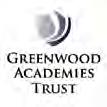


Partner Academy Chains
PROGRESS AND ACHIEVEMENTS
27,251 hits in the first five months after launch
1,426 game users

154 UK schools partners


19,646 the high score of top Gameplan player Amina H. Ahmed
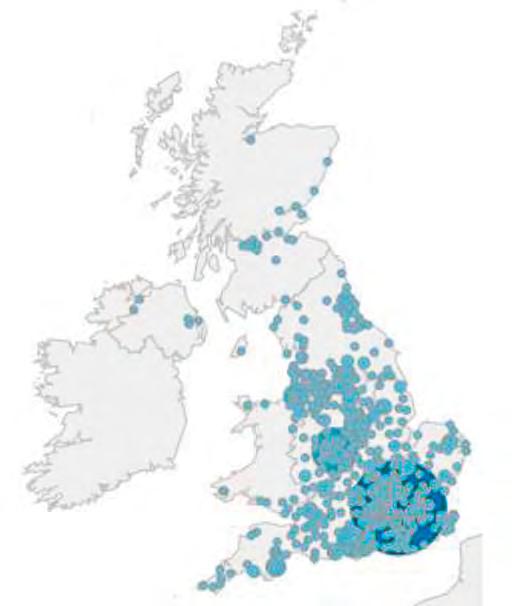
Gameplan use across the UK
10
1
2,647
Case study
Ormiston Academies Trust
Ormiston Academies Trust have found the Gameplan partnership very beneficial. The primary advantage of the partnership is that it allows academies to provide their students with high quality university-focused information advice and guidance (IAG) in an ‘off the shelf’ manner. With school resources and staff time at a premium the wealth of material provided by King’s ensures that school leaders can spend their time ensuring maximum participation and engagement rather than designing the programme from scratch.
The scheme of work also provides a focus and framework for high quality, sustained provision for students over a period of weeks and months rather than as standalone, short-term, interventions. We are confident that this will maximise impact.
From the Trust’s point of view, where schools are using the scheme of work and Gameplan we can have confidence in the quality of university IAG provision and can therefore focus on developing and extending other elements of the school’s wider curriculum.
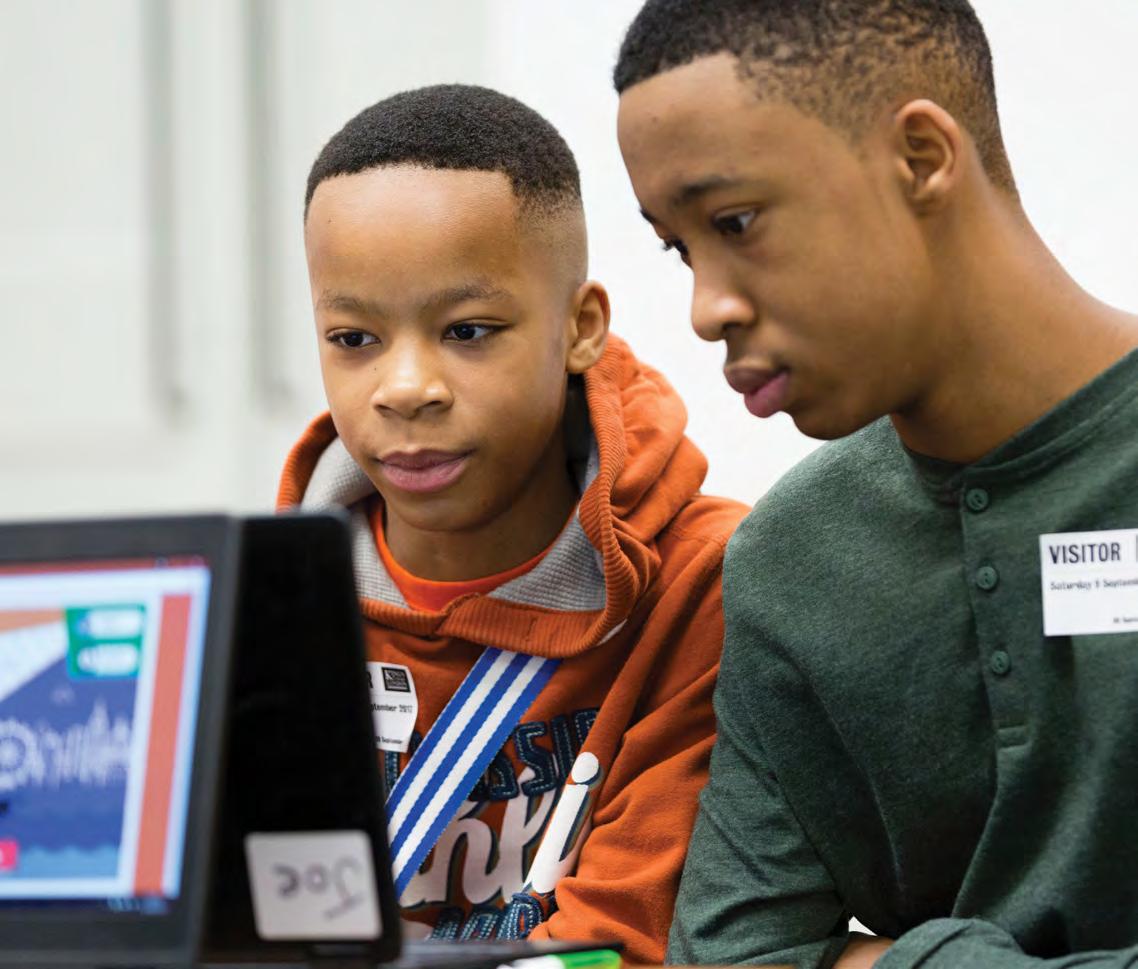 Simon Pedley, Post-16, Progression and More Able Advisor, Ormiston Academies Trust
Simon Pedley, Post-16, Progression and More Able Advisor, Ormiston Academies Trust
11
PROGRESS AND ACHIEVEMENTS
1,072 applications to K+ for the 2015–17 cohort
8 A*/A grades at GCSE, the average for K+ students
98 schools participated across London Times Higher Education Award nominee
The flagship post-16 widening participation programme is now in its seventh year and has supported over 1800 students from low-income backgrounds and vulnerable groups to progress to higher education.
This year 61 K+ graduates are beginning their studies at King’s and joining the group of 170 King’s students and graduates who completed the K+ programme. In autumn 2017, 280 students will join the seventh cohort of the K+ programme.
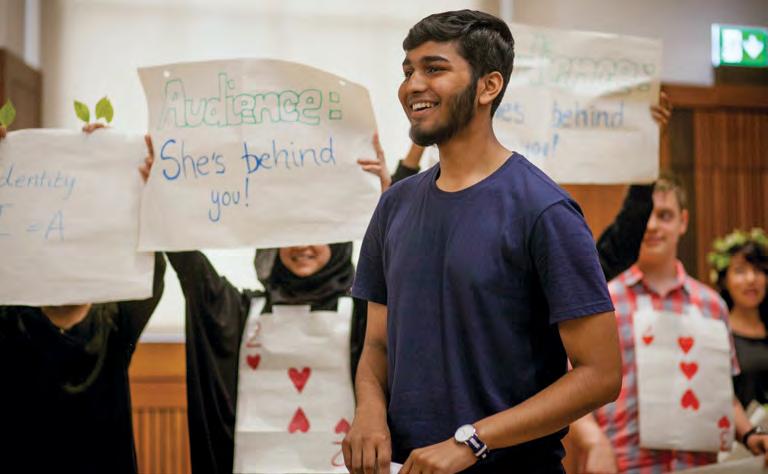
Each year we see K+ students grow dramatically in confidence and in academic and social skills through the K+ Spotlight summer school.
This summer K+ students got an authentic taste of studying their chosen academic subject by participating in a week of intensive small group tutorials with PhD tutors trained by our partners at The Brilliant Club. Students then had two weeks to complete an academic assignment which was marked by their tutor to degree standard. An important outcome of this is the development of key academic skills in research, writing and referencing which will ensure students feel prepared for university level work.
K+ students also received essential advice in making a successful university application
from admissions professionals in preparation for making their applications in the autumn.
The Bhangra, Dance, Student Media and Dietetics Societies engaged K+ students in interactive workshops in order to demonstrate the social aspect of university and students got the chance to build on new relationships from the dizzying heights of the Shard and London Eye.
For the first time this year K+ applicants who were given a King’s offer received a dual offer in recognition of their successful completion of K+. The variable K+ offer is worth up to two A-level grades or equivalent below the standard offer. The variable offer recognises the high level of commitment students have shown on the programme by engaging in events, mentoring, an academic piece of writing and a summer school. The introduction of the variable offer has already had a significant impact on K+ student applications, offers, acceptances and enrolments to King’s.
In 2016 K+ was nominated for the Guardian University Award and this year the scheme has received a prestigious nomination for The Times Higher Education Award.
12
K+
programme
K+ students benefit from six strands to the K+ programme: ACADEMIC Engage in university style teaching and gain deeper subject knowledge through an independent academic project.
CAREERS
Explore a variety of career choices and develop higher education and workplace skills.
CULTURE
Develop skills of academic enquiry in learning environments outside of the classroom.
E-MENTORING STUDENTS
regularly engage with a role model student who studies a course related to their aspirational subject.
Case study
HIGHER EDUCATION SKILLS
Receive information and practical support in applying to university and succeeding on a course.
1 2 3 4 5 6
SPOTLIGHT SUMMER SCHOOL
Participate in a nonresidential summer school with small group tutorials and develop their public speaking skills through group presentations.
Neetu Singh, Languages & Literature stream
‘The students on K+ are from different parts of London, so we didn’t know each other before we came here. I’ve met some really nice people – there’s a sense of engagement inside the lecture rooms and everyone shares the same passions and wants to do well, which is really powerful.
Being part of this scheme has confirmed to me that I would love to go to university, one hundred per cent. I’m definitely going to apply to King’s because of the people, the buildings and the teaching. It seems like a good place to learn, but also to socialise as well.’
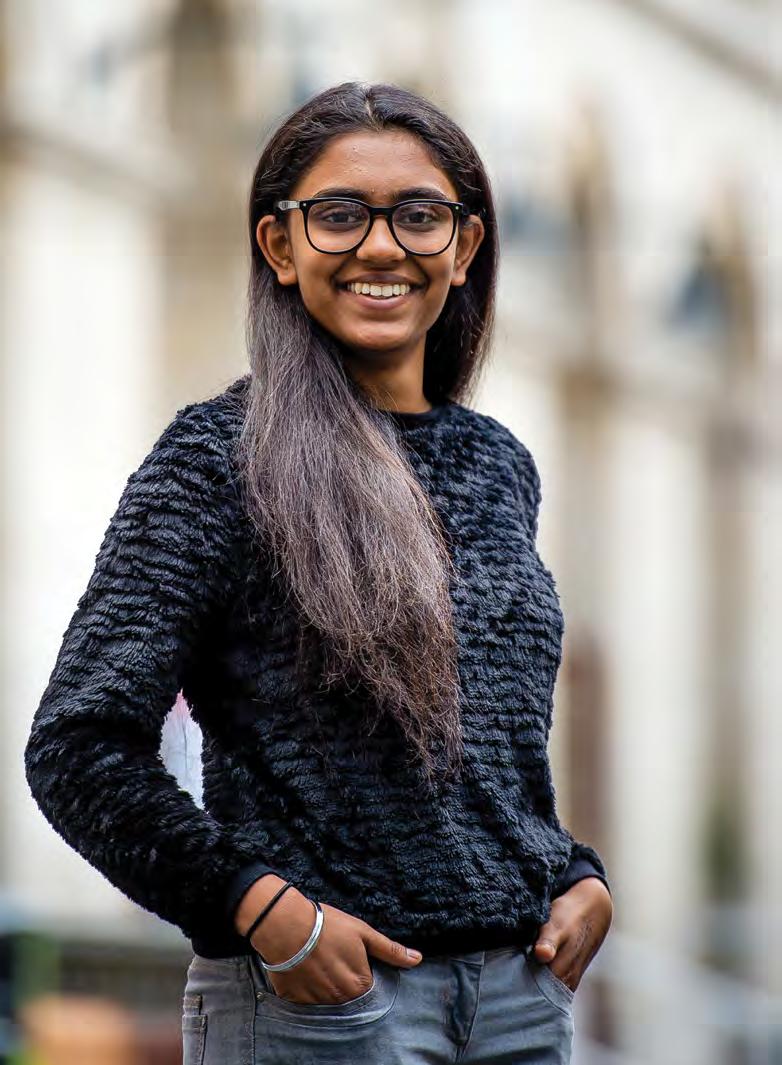
Realising Opportunities
King’s is running its eighth cohort of Realising Opportunities (RO) this year. The programme is a national collaboration of 14 leading, research intensive universities working together to promote fair access and social mobility. There are 1,000 Year 12 students on the programme nationally this year, 76 of which are supported by King’s.
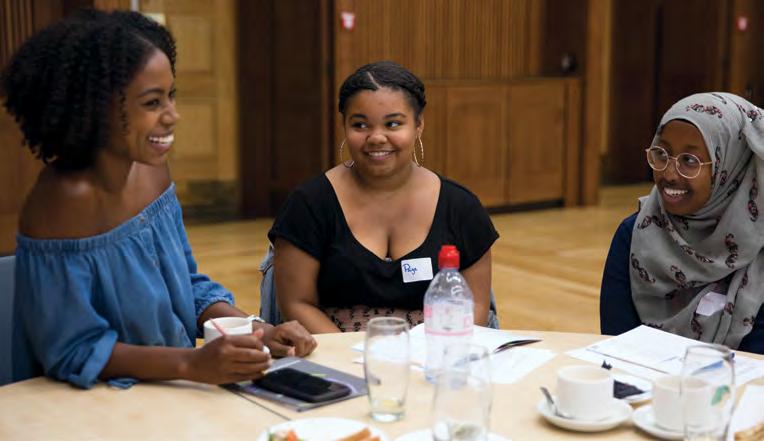
Students on the RO programme benefit from a programme of events, information, e-mentoring and support. This year, we’ve run six events for our RO students at King’s, including sessions on careers and employability, academic writing and introducing students to student finance and personal statements.
academic element of the programme. Many of the students do not need the alternative offer to gain a place at an RO university, however it often gives them the confidence they need to submit an application.
PROGRESS AND ACHIEVEMENTS
76 students from 10 schools across London
26 RO students started at King’s in 2016
There is also an emphasis on academia, and students are encouraged to work with a PhD tutor for eight weeks over the summer to develop a 2,000 word academic assignment. Participants are given access to the King’s libraries, and can use these as a quiet place to work as well as accessing a variety of academic material.
One of the added benefits of the RO programme is that participating universities give applications from RO students additional consideration, and may also give an alternative offer that is lower than the standard offer normally given. This is in place as recognition of the student’s commitment and the strong
‘When I first entered the Realising Opportunities programme I didn’t really know what to expect, but coming from a low-income background I was extremely excited for this amazing opportunity, especially as no one in my family had gone to university. Realising Opportunities helped me understand the university process and the academic aspect that would be required at university. Working directly with King’s College London has also given me a lot of experience and the aid of mentors and PhD tutors has helped me improve my academic skills massively.’
Minara, Current Realising Opportunities Student
‘I co-ordinate RO for both schools. The students have got some fantastic RO offers and even more importantly have spoken with such enthusiasm about what they have got out of the project. It has been life changing for so many of them.’
Chris Jarvis, Careers and Partnerships Advisor, St Angela’s and St Bonaventure’s Schools
14
The Sutton Trust Summer School offers bright students from across the UK the opportunity to experience undergraduate life first-hand. Our programme aims to stretch students in their academic work, and to push their comfort zone, by allowing them to live away from home –sometimes for the first time – with like-minded students whom they have never met before.
During the week, we provide students with information and guidance on applying to university, student finance and how to improve the vital skills they need to succeed in higher education. This helps them grow in confidence to apply to highly selective universities.
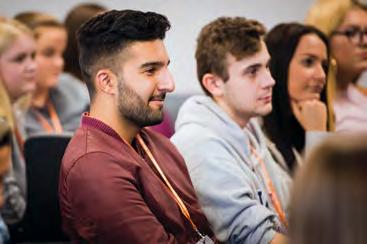
This year we welcomed over 100 Year 12 students from England, Scotland, Wales and Northern Ireland on our campus for our fifth annual summer school. The students stayed with us for one week studying one of four subject streams: Geography; English Language and Linguistics; Pharmacy; or Politics, Philosophy & Law.
To give an authentic university experience, students worked at first-year undergraduate level with King’s academics and PhD students in lectures, seminars and practical lab sessions. Some sessions were held outside of the classroom in the heart of London, including the Supreme Court and the River Wandle. At the end of the week students deliver a presentation on a subject area they
had focussed on during their sessions. The presentations showcase their in-depth subject knowledge, creativity and increased confidence and are shown to the summer school cohort, and a panel of judges made up of professional services staff, academics and current students.
To help students achieve their potential to study in a highly-selective institution, they were given information and guidance about accessing higher education. This included personal statements, student finance, resilience, motivation, social media and presentation skills.
The university experience involves more than academic study, and the summer school is no different. Each evening the students enjoy a social activity, where they can relax and bond with their peers from all over the country. This year students took part in a film night, pizza night, quiz night and enjoyed evenings on the London Eye and a boat cruise on the Thames.
PROGRESS AND ACHIEVEMENTS
2016 COHORT 107 students completed the week
7 A*/A grades average GCSEs for participants
2017 COHORT 117 students completed the week 7 A*/A grades average GCSEs for participants
ATTENDEES
80 %
are more likely to achieve a 2:1 or higher in their undergraduate degree than their peers
53%
are more likely to go on to leading universities than their peers
15
Sutton
Trust Summer School
Sutton Trust nationwide OF SUTTON TRUST SUMMER SCHOOL
Outreach for Dentistry
Students face many hurdles when applying to dentistry: grades, personal statements, the UKCAT and interviews. The Dental Outreach programme helps bright students in London from non-privileged backgrounds to develop the skills and confidence they need to apply to a highly competitive dental school.
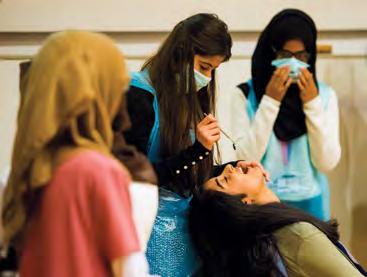
School visits
In collaboration with the King’s College London Dental Society (DentSoc), we visit schools across London to educate and inspire students about a career in dentistry, and provide them with advice on applications. The DentSoc volunteers are role models to the students, and give them a valuable insight into the life of a dental student.
Evening lecture series
Every month we welcome over 150 state school students from across London to Guy’s Campus, offering advice on each aspect of the application process to dentistry as part of the evening lecture series. Students hear from
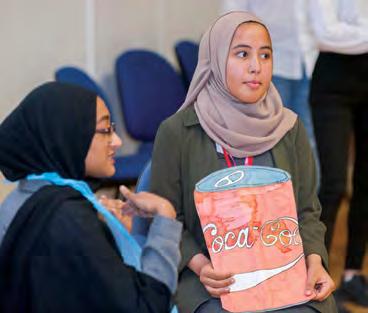
professional services staff and current students and can learn about King’s ground-breaking research from one of the professors in the Dental Institute. Many students on our programmes have little opportunity to go beyond the curriculum for dentistry, which is a desirable quality for many admissions tutors. The research lectures whet their appetite for further reading in dental research and allows them to explore beyond their sixth form curriculum.
DentView
Every year we take up to 40 Year 12 students on our DentView programme. As part of their three-day intensive taster programme, students complete workshops on the university application process, attend a real undergraduate lecture and have mock tests in the UKCAT and multiple mini interviews: two of the four main hurdles in accessing a top dental school. The programme is highly competitive, with just under 200 applications for 40 places in 2017.
‘I can certainly say that it is the most beneficial and fun experience I have ever taken part in. The dental placement is the most insightful experience a student in my position could have had, as it really opened my eyes to being a dentist and a dentistry student. It gave me a well-rounded view of what is yet to come on my journey toward being a dentist.’
DentView participant, 2017
Enhanced Support Dentistry Programme (ESDP)
Ten new students joined our undergraduate cohort in BDS Dentistry in 2016 as part of the Enhanced Support Dentistry Programme. The students will follow the same curriculum as BDS Dentistry students, but receive additional pastoral support during their university career.
16
Student
in collaboration with DentSoc
enrolling on ESDP PROGRESS AND ACHIEVEMENTS
attendance 150+ at evening lectures each month 32 attended DentView over two weeks 35 schools visited
10 new undergraduates
Outreach for Medicine are a dedicated team from the King’s College London medical school working with students from non-selective state schools in London, through a selection of on and off campus programmes, to encourage and enable students to access a career in medicine.
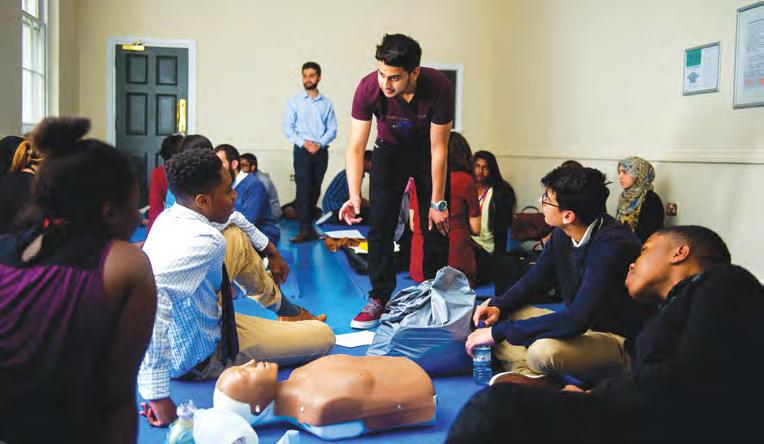
Clinical skills school visits
The visits bring the clinical setting to the classroom through in-school sessions. This year, 37 schools received visits and students were taught how to take blood, measure blood pressure and suture wounds. These sessions, delivered by current Extended Medical Degree Students, bring science to life and enrich the students’ science curriculum.
‘This workshop has helped me experience what it would be like to be a doctor and has made me want to be one in the future.’
Clinical Skills Workshop participant, 2017
Medical activity days
This year 22 medical activity days were hosted on our Guy’s Campus. These hands on and high energy days enable students in Key Stages 3 and 4 to get a taste of university life as a medical student. The morning is focused on learning about human biology, followed by a campus tour and then mastering clinical skills such as CPR and taking blood.
Evening lecture series
The Medicine 101 and Medicine in Action lecture series enable sixth form students to gain an insight into different medical careers and assist them in navigating the rigorous application process to study medicine. The talks are given by clinicians and King’s staff; they cover everything from the day-to-day life of an oncologist, to how to craft your personal statement. These talks are held on campus throughout the academic year and regularly attract 200 students each week.
Med View
Med View is an intensive three-day course designed to equip Year 12 students with the skills, experience and confidence needed to make successful applications to medicine. This year, 40 students were granted the opportunity to do clinical work experience, taster lectures, mock interviews and much more.
‘The programme has been prepared by extraordinary people that want us to do well. I really enjoyed my work experience placement because every single doctor I met that day was strongly enthusiastic. Similarly, all the guest speakers were highly inspiring and I feel extremely lucky for taking part in Med View.’
Med View participant, 2017
Outreach for Medicine
PROGRESS
AND ACHIEVEMENTS
200 students attend evening lectures each week
37 schools received clinical skills sessions
22 medical activity days hosted on campus
17
Care leavers
Nationally, looked after children do not achieve the same success at school as their peers. The latest statistics reveal that only 13 per cent of looked after children achieved five A*–C GCSEs including English and Mathematics compared to 58 per cent of their peers.
This inequality is further exacerbated at higher education level: only six per cent of care leavers entered higher education compared to 38 per cent of non-care experienced students in 2013–14 (Department of Education).
King’s College London is committed to supporting students from a care background throughout the student life cycle. We have a designated member of staff who coordinates the support across the university and is the first point of contact for care experienced and estranged students during their course.
We have an embedded verification process for care experienced students applying to King’s College London. This enables us to apply a contextual admissions process as well as tailor
Case study
our support accordingly and extend our offer of support to local authorities and virtual schools.
Our pre-university support for care experienced students includes: bespoke introductory days for care leavers and training for local authority staff, individual personal statement advice and individual application support. Once students enrol at King’s College London they receive the option of 52-week accommodation as well as bursary assistance. They are invited to attend an induction event and meet with an undergraduate buddy who will be a ‘friendly face’ at the university.
In order to achieve a holistic support programme the university works closely with many external stakeholders, including UNITE Students who offer accommodation scholarships. In addition, we acknowledge that the difficulties these students face may continue once they graduate so we collaborate closely with the Drive Forward Foundation in offering paid internships and other career opportunities for care experienced students.
Are you a care leaver? So am I and there’s loads of us at King’s
King’s College London is not just a prestigious institute dominated by the wealthy, but a place where people like us are supported in almost every aspect.
Before I started uni, I was already stressed, worried and over-thinking whether my student finance is enough to get me through the years with no additional funding with questions such as where am I going to live, how am I going to integrate and how my academic performance would be affected by the change of environment.
If I didn’t tell King’s about my background I wouldn’t be seeing myself performing as well as I am now. I was lucky to be offered free top-notch accommodation for three straight years near the Strand Campus, the support of a Uni Buddy worked out well and you get to know King’s with a warm welcome from the Widening Participation team. Now I am a student ambassador and have opportunities of securing top internships such as J. Walter Thompson and Civil Servant with King’s partners such as UpReach.
All those questions including: ‘where am I going to live?’ and ‘how am I going to survive as an independent student?’ have been put at rest as I take advantage of King’s support and come out of King’s with a top graduate job.
Second Year student at King’s College London and care leaver
18
This year the Widening Participation Department commissioned a report with LKMco, the education and youth think tank, on the under representation of Gypsy, Roma and Traveller students in higher education.
This area is under researched and has received limited focus until now. Our report revealed that Gypsy, Roma and Traveller (GRT) pupils are ten times less likely to go to university: three to four per cent of Gypsies, Roma and Travellers aged 18 to 30 accessed higher education in 2014, compared to 43 per cent of 18-30-year-olds in the national population.
The research included an existing literature review, a roundtable comprising academics and expert practitioners including those who were from Gypsy or Traveller backgrounds themselves, interviews, school case studies and pupil focus groups.
The report shows that ongoing prejudice combined with poor school outcomes makes progression to university a struggle for many pupils. Back in 2004 Sir Trevor Phillips, former Equalities Commissioner, described prejudice and discrimination directed at GRT groups as ‘the last respectable form of racism’. Our research shows this continues to be the case with members of the Gypsy, Roma and Traveller communities telling researchers that ‘remorseless bullying’ led many pupils to hide their identity and to feel that they were not welcome in education.
However, there are clear recommendations emerging from our research which education providers across the sector can implement to improve education outcomes. These include encouraging parents and pupils to identify their GRT status and offering reassurance that this will not result in discrimination, as well as further supporting home-educated pupils.
King’s College London remains committed to supporting students from a forced migrant background and this year we have further developed our response to the current refugee crisis.
The department has arranged several Introduction to University events to support refugees and asylum seekers in collaboration with Article 26, the Refugee Support Network and Student Action for Refugees (STAR). The events have covered student finance eligibility related to immigration status and specific advice on applying to university.
We also hosted the Implementing Scholarships for Higher Education university practitioner seminar which enabled a comprehensive review and revision of current processes to support the development and delivery of scholarships at UK institutions.
King’s College London has again offered two Sanctuary Scholarships for students who cannot access student finance as a consequence of their immigration status. These scholarships cover the costs of their
tuition fees as well as providing a grant which is equal to the maximum student loan each year. As a result of this, King’s has become an example of best practice and has been used in campaigns by the Refugee Support Network and the charity Let Us Learn.
We also recognise that in addition to financial support, these students may require additional personal support. Our specialist student advisor is available to help them navigate the transition to higher education and any potential issues whilst on their course. The department also sits on the Article 26 scholarship steering group and regularly advises other universities about setting up their own schemes.
‘King’s College London has not only embraced the implementation of its own scholarship scheme, but is contributing more widely to sharing and improving scholarships and opportunities for forced migrant students.’
Rebecca Murray, Co-Founder and Director of Article 26
19
Gypsies, Roma and Travellers Forced migrants
Success at university
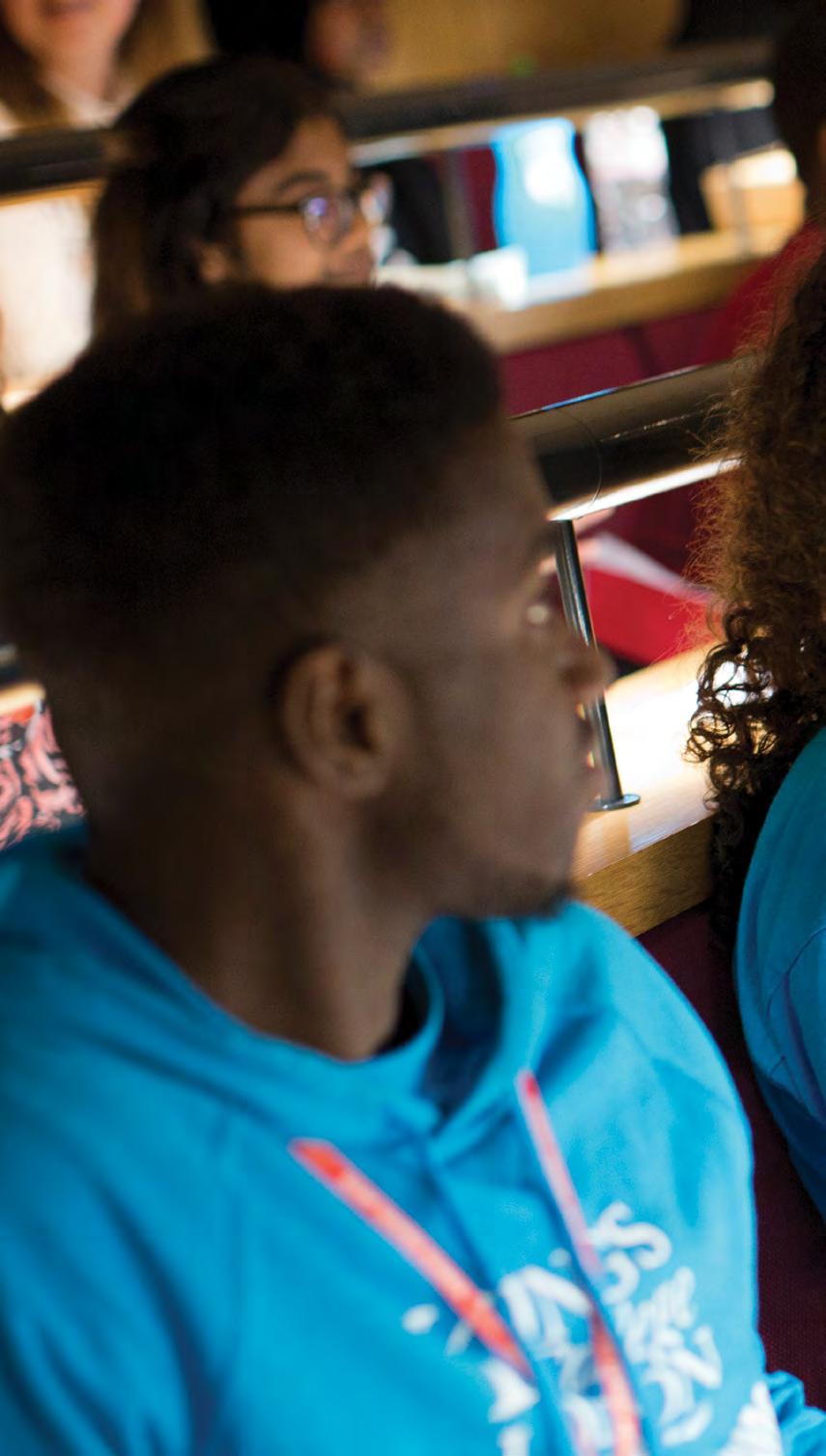
20
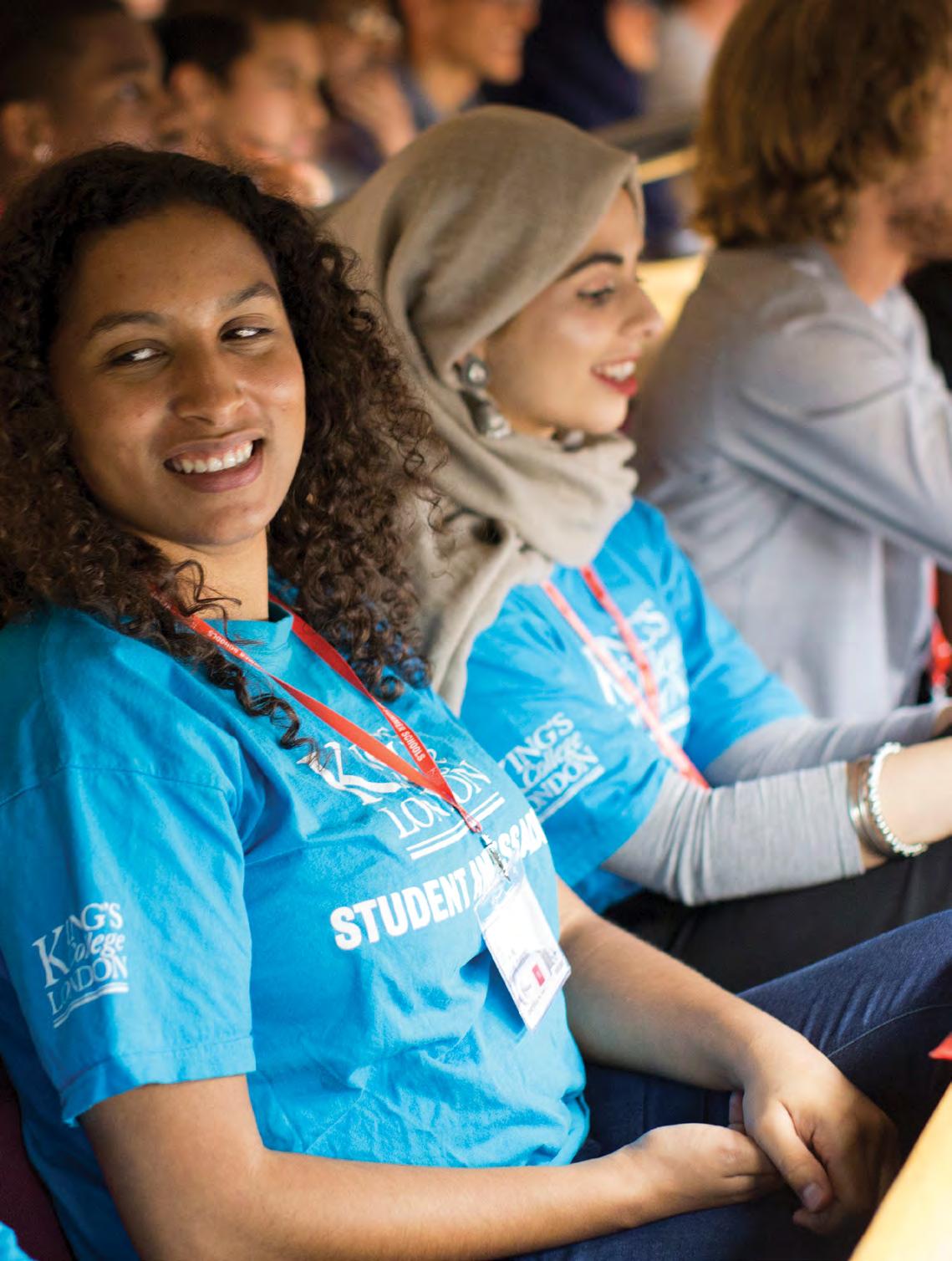
21
Behavioural Insights in Higher Education


Behavioural insights in higher education @KCLxBIT
Over the past year we have developed a unique collaboration with the Behavioural Insights Team (BIT) to explore whether the application of behavioural insights can improve the outcomes of non-traditional students in higher education. This is the first time behavioural insights have been applied in a UK university context.
BIT is the world’s first government institution dedicated to the application of behavioural sciences to improving policy and service provision. Behavioural insights ‘nudges’ are designed to encourage people to make better choices for themselves.

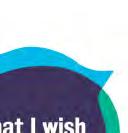

Over the past year, we have delivered an ambitious programme of seven randomised control trials (RCTs) involving over 4,000 first year students, and have applied behavioural insights in the King’s context. Five of the trials have sought to increase student engagement with key services by sending students behaviourally inspired text messages.
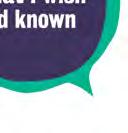
The messages tested both if receiving a text will increase the likelihood that a student will engage with the service mentioned, and also whether the type of message received will produce differential outcomes in behaviour. The RCTs have produced demonstrable evidence that behavioural science can boost engagement for undergraduates from widening participation (WP) backgrounds.
The project has also included the development of a longer-term support programme which has tested the effectiveness of behavioural insights approaches in increasing WP students’ sense of belonging at King’s.
The programme, called What I Wish I’d Known, will be further developed next year to ensure we are able to offer wrap-around support for our most financially challenged students. All trials have, in addition, been supported by a pulse-point panel study, which has explored widening participation student mind-sets and their emotional experiences during their first year in higher education, revealing key differences in WP and non-WP student journeys.
We have gained key insights from the KCLxBIT project which will allow us to develop more effective and targeted interventions to build our full student lifecycle support for WP learners at King’s. Our approach throughout has been highly empirical; ideas are researched, tested and trialled, which has enabled us to understand what works and, importantly, what does not work. The legacy of the KCLxBIT project will be continued by the newly founded King’s What Works unit, which will be based in the Social Mobility and Student Success division.
Full results of the KCLxBIT project will be published by December 2017. Detailed information on the trials can be found on our project blog at https://blogs.kcl.ac.uk/ behaviouralinsights/.
22
Mature learners
Case study
Christine, Nutrition & Dietetics
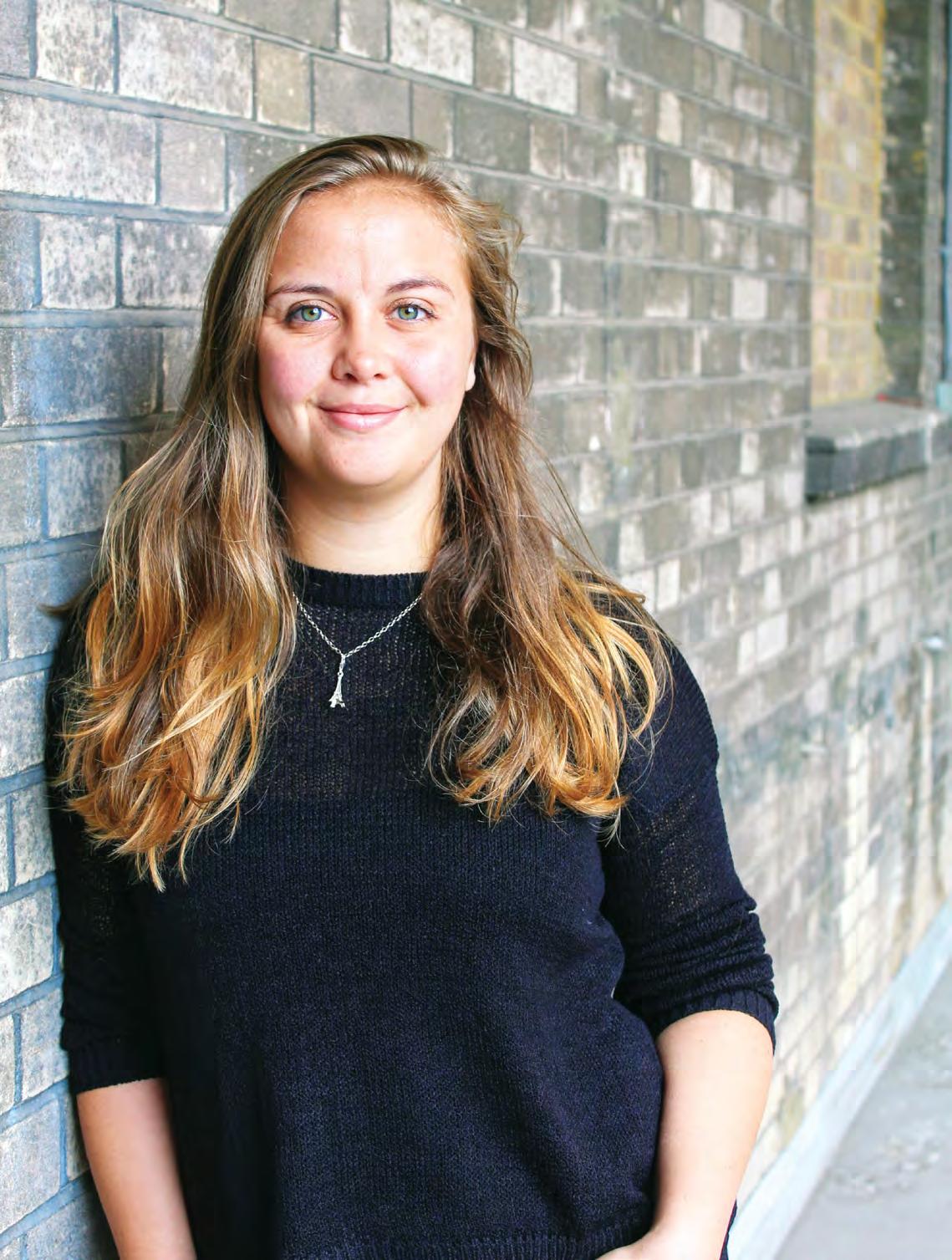
I’m 27 and I’m starting my second year studying Nutrition and Dietetics at King’s College London. I decided to come to King’s College London because it felt more ‘business-y’ than the other universities. Compared to many campus style universities I looked around, which felt like going back to school, King’s is in the heart of London and it feels more serious, almost as if you’re going into your office!
King’s has the highest number of mature students in the Russell Group, and on my course around half of us are older. As a mature student I was expecting to have quite a distant relationship with the university, but I’ve been surprised by how much support you receive. I’ve found I can talk to my lecturers a lot and email them if I have questions. They have been really supportive.
The best thing about being a mature student is that you really use all the resources available to you. Most mature students have been working and we are used to having to get things done on our own, so we’re not afraid to ask the lecturers for help. From day one I’ve really appreciated being here; I understand the value of the money and time I’m spending here.
I’d 100% recommend coming to King’s as a mature student. If you want to change your career or your life and can, then I’d say go for it! It can feel quite scary to stop working, but it’s fun, and very empowering!
23
Study abroad
Case study
Berfin Karaaslan, Leadership Development Programme, Nairobi, Kenya
University is the time when you can really try new things, challenge and develop yourself. By interacting and communicating with lots of different people from different places around the world, I realised my growing interest for different cultures and traditions and believed that a study abroad opportunity would really allow me to explore that interest. In addition, the idea of studying abroad, being so far from home, seemed dreamlike because I am the first person in my family to attend university. I felt like studying abroad will break that imaginary boundary that students like myself have created.
The programme was a huge eyeopening experience and I took a lot away from it. One thing that I feel that was a huge lesson was the idea about core and flex. Our cores can differ depending on what we value eg honesty, equality, religion etc and our flex is what makes us understand other people’s cores. It was the question of what am I able to be flexible with to be culturally intelligent.
Widening Participation in Outward Mobility Project
The Widening Participation Department and the Global Mobility Office at King’s have jointly committed to ensuring study abroad remains accessible to all students.
For two years now, we have been running fully-funded summer study abroad programmes. This year, the programme took our widening participation learners to Nairobi, Kenya, for a week-long leadership development programme.
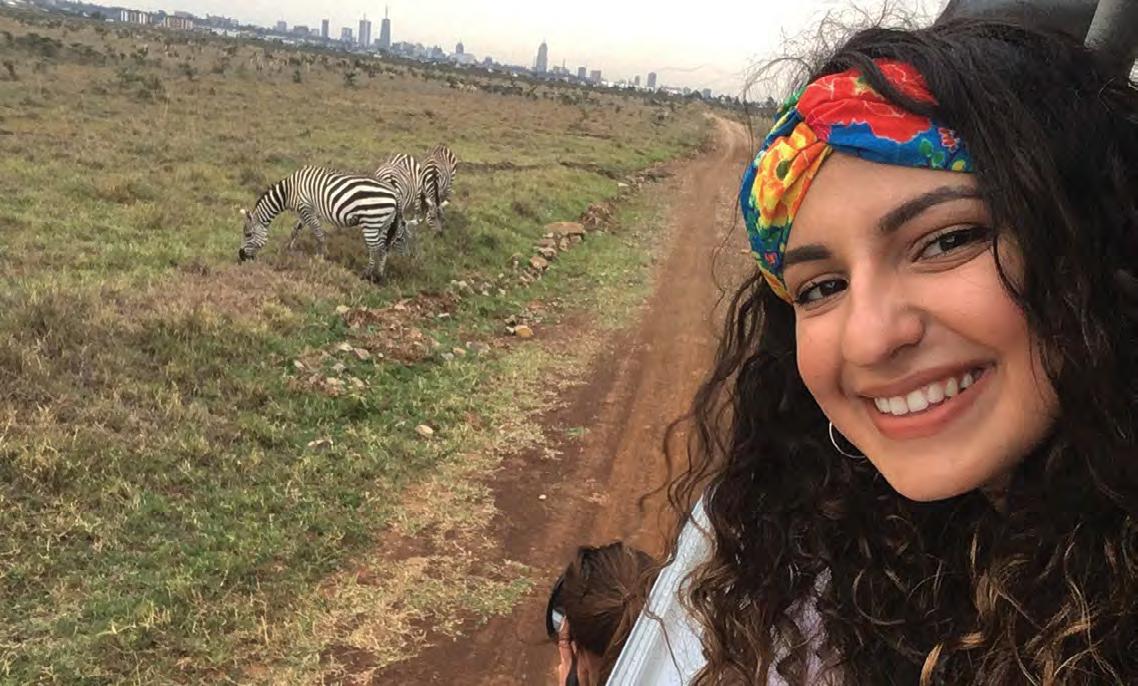
Broadening Horizons Award
The Broadening Horizons Award is a key part of our strategy to ensure that widening participation students can access the mobility opportunities available to them at King’s. Funding is distributed to home students who are eligible for/in receipt of the King’s Living Bursary, or who have taken part in Realising Opportunities, K+ or a Sutton Trust Summer School. In the past year, 212 King’s students in total received over £151,000 in Broadening Horizons Award funding to participate in semester/year abroad opportunities, summer schools, field trips or short-term placements such as internships or research activity abroad.
24
Arkam is a second year Geography student, Widening Participation Ambassador and ambassador for the charity Let Us Learn. Hasan is a second year student on the Extended Medical Degree programme and a Widening Participation Ambassador.
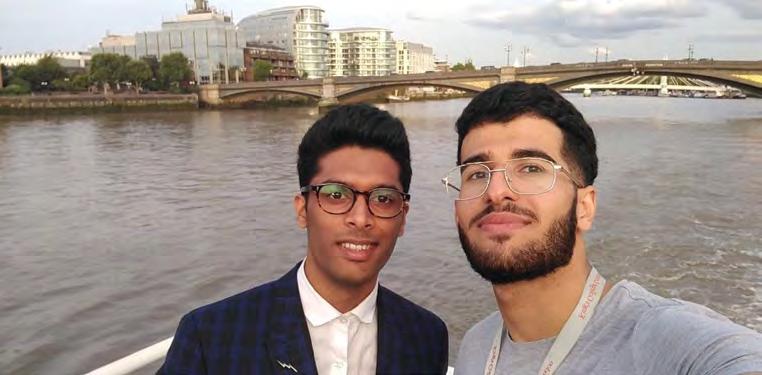
ARKAM: I think there were a lot of things that motivated me [to apply for the WP internship], but the most important was my own background. I am at King’s because of the WP Department, and if it wasn’t for King’s, then I wouldn’t be here. For me to be a part of this is the best thing I can possibly do.
I think I’ve developed a lot of things. I’ve learnt to use social media, how to use it best, effectively, in the current environment. My communication has improved because you receive about 20, 30 emails, so how to communicate, when to communicate, that’s a big skill that I’ve learnt, and planning for things.
I was put in charge of organising events, where I had to lead the whole planning, and that was a big responsibility, but to have that on me, it means that I get out of my comfort zone, so that was something really big.
It’s been an amazing experience, seriously. I never thought I would have learnt so much. I just feel I’m in so much of a better place going into my second year. I appreciate things a lot more. I got a taste of the working environment, and I think I’m prepared for everything now.
HASAN: I guess I should mention my background first, in that I am a widening participation student myself. I was involved in the Outreach For Medicine at King’s College London, prior to applying for medicine.
I’ve always had an interest in widening access and social mobility, so I found that interning with the Widening Participation Department at King’s College London would provide me with a great opportunity to learn about how everything is run, the logistics and dynamics, I guess, of organising such large scale widening participation programmes.
My experiences have been great. I’ve been able to see how the summer schools work from every single position. I’ve worked as a fully-fledged student ambassador, with the students, but also behind the scenes in the planning and preparation of the programmes, and finally, as a presenter in the summer school as well, whereby I had to deliver some sessions.
I believe the experiences which I’ve learnt here, at a larger institution, will allow me to use the same skills, and teach others how to go about widening participation, and what sorts of initiatives work, and what sorts of initiatives don’t work. It’s definitely something which I will take up in the future, alongside my studies, and it will be something, a main goal, in my career in the future.
25
Students supporting the next generation
Arkam Muhammad Babar & Hasan Nawab
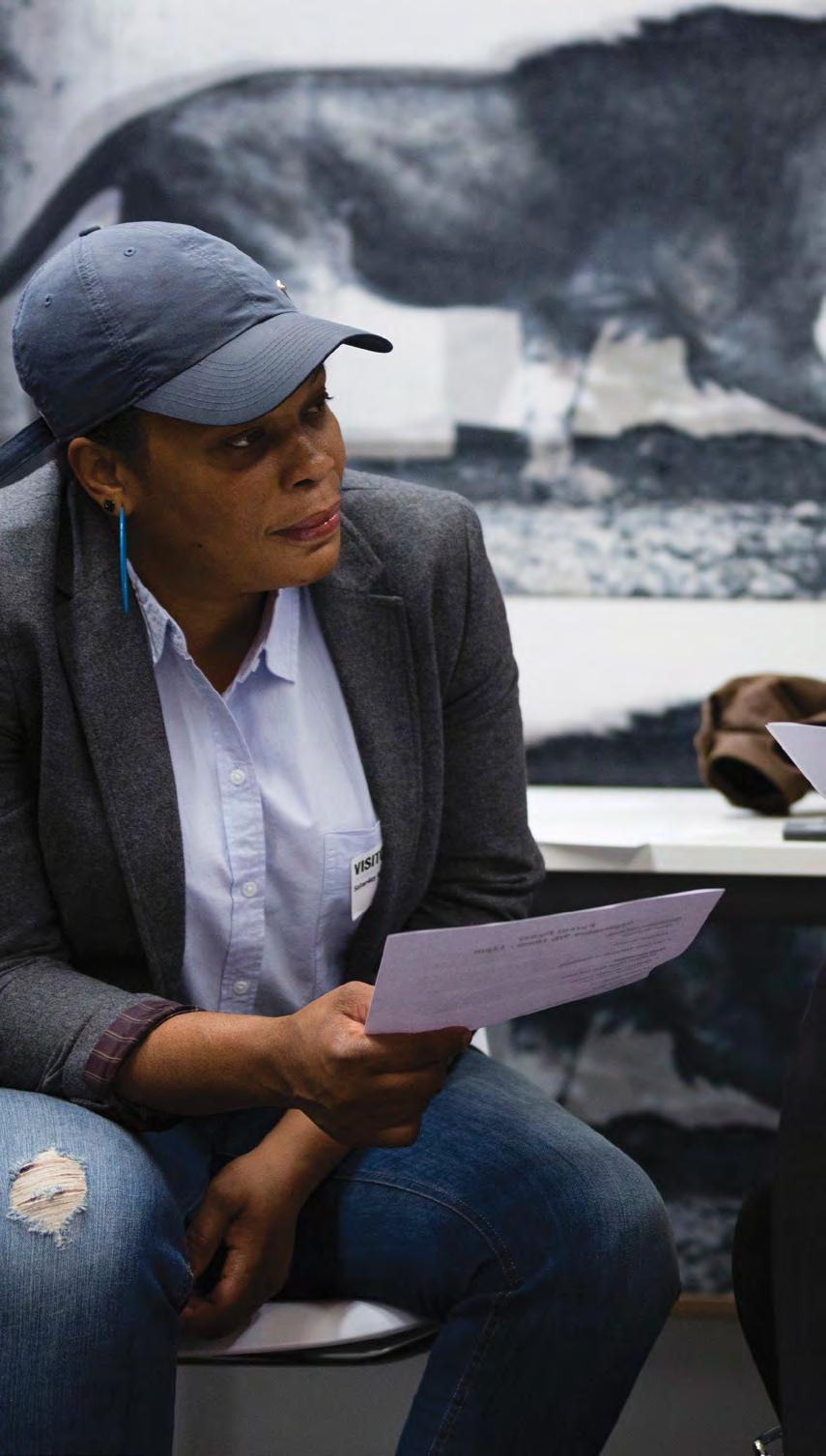
26
Partnerhsips
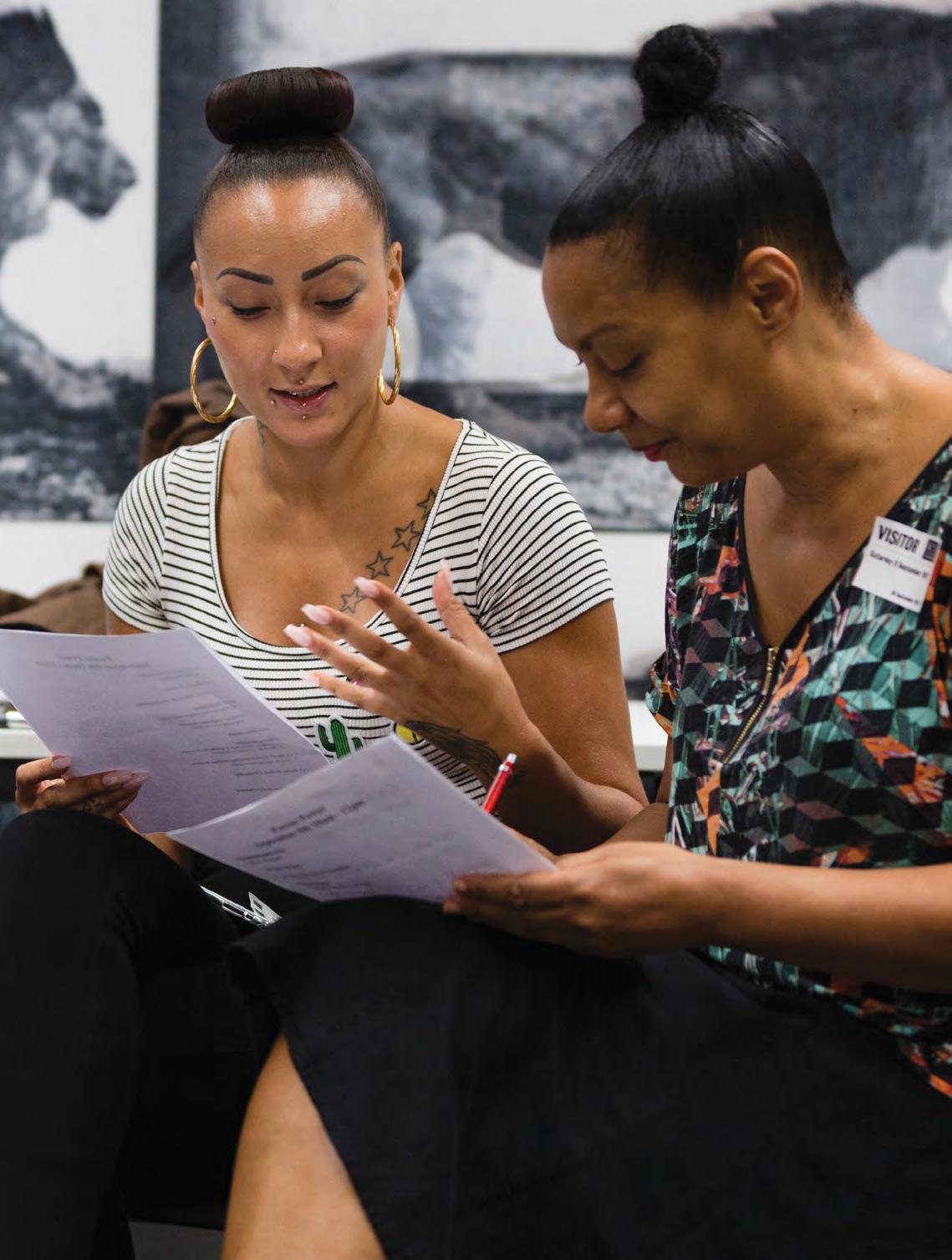
27
Parent Power
Case study
April Higgins
‘I’ve really enjoyed meeting other parents as part of the Parent Power programme. It is great to meet parents who have the same concerns and care about the same issues. It’s also really shown me that if you come together as a group you can achieve things as parents that you would not have been able to achieve alone.

In terms of what I’ve learned on the programme, statistics around how many under-represented students go to top universities have really shocked me. It would be so great to try and change these. I’ve also learned things that can help my own daughter. She is a year 8 student who loves all things performing arts and wants to pursue that. I’ve learned in the sessions that she doesn’t have to study that at university to carry it on, but can instead study any degree course and enjoy performing in student societies.
I really hope that we can make a difference on the Parent Power programme by advising other parents and using our knowledge to support those who may be concerned or worried.’
28
Research strongly indicates that parents and carers have a significant impact on pupil outcomes, aspirations and decisions.
As Dr Janet Goodall, Lecturer in Educational Leadership and Management, asserted in 2011, ‘The more parents are engaged in the education of their children, the more likely their children are to succeed in the education system’. King’s College London’s Widening Participation Department has long agreed, and has consequently committed to engaging parents and families across our programmes.
To further enhance this engagement, this year the department has founded a distinct parents’ programme, a project specifically designed to engage the parents of underrepresented children and harness their influence to improve the chances of these pupils attending highly selective universities.
This project is called Parent Power and has been founded in partnership with Citizens
UK. Parent Power uses community organising techniques to recruit and train a group of local parents, enabling them to become university access experts who can aid local students in their journey to higher education.
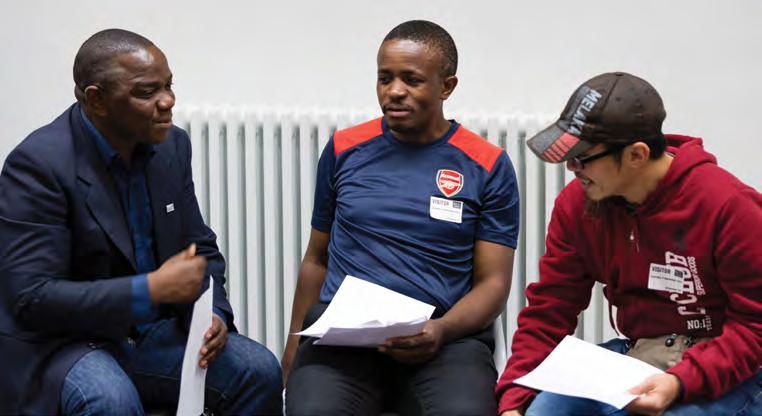
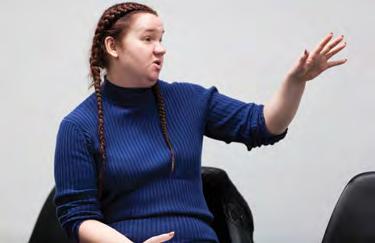
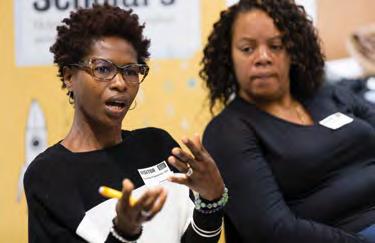
So far the project has engaged over 100 parents, training 30 Parent Power leaders in university study, student life, student finance and more, in addition to learning methods of community organising which will be used to mobilise, and support other local parents and pupils. The project has also enabled the department to better understand the concerns of local families. Through events, meetings and one-to-one discussions with parents and carers across Lambeth and Southwark the department has been able to better engage with our local community.
‘It feels brilliant that we, as parents, ourselves, won a trip to visit one of these universities. I got to go to Oxford. People from around the world dream of going there. We’re genuinely ecstatic that we won a trip there. But this is only the start; now we want to open up these top universities.
Jennifer
‘The more parents are engaged in the education of their children, the more likely their children are to succeed in the education system.’
Goodall et al, 2011
29
McIntyre, Parent Power leader following a visit to the University of Oxford
King’s Advocate Award
The King’s Advocate Award enables teachers and social workers to support some of the most disadvantaged pupils in London to succeed in applying and studying at university.
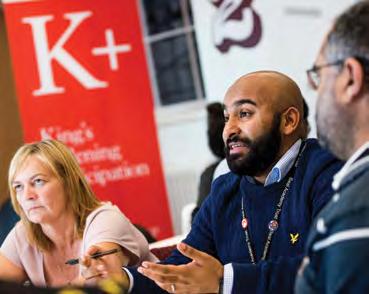
Bursaries
We are proud to support access to the teaching and social work professions by providing bursaries for participants on the King’s Advocate Award who are in the initial year of their profession. The teachers and social workers we support undertake teaching roles in non-selective state schools and social work roles in local authorities across Greater London. We are pleased to have seen relationships with these institutions strengthen through the work of our King’s Advocates.
Project Grant
In 2017 our King’s Advocates were invited to apply for a project grant of up to £500 to deliver widening participation initiatives in the context of their roles. We have been delighted to support long-term projects to develop literacy for students via the medium of poetry and practical science skills in schools in the Greater London area. Successful applicants are invited to use spaces, facilities and staff at King’s College London to enhance their project grant initiatives.
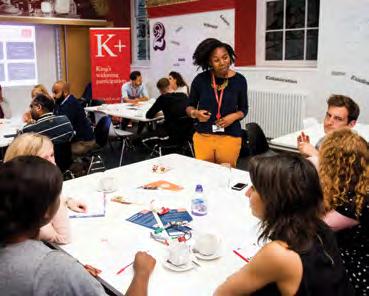
Our participants
Continuing Professional Development
The training calendar that we provide as part of the King’s Advocate Award raises awareness of some of the challenges faced by the most under-represented groups within higher education and gives a first-hand insight into how to support learners to succeed in accessing higher education.
Our participants will take part in training led by experts across a diverse range of institutions. Content will include:
• u niversity admissions and UCAS
• behavioural insights for education
• supporting under-represented groups
• professional development in early years teaching and social work.
Staff members at King’s College London are welcome to join the School Governor Network by completing a short online form on our webpages. This can be found by searching for ‘King’s School Governor Network’ on the King’s website.
The King’s Advocate Award is unique in being the only programme which brings together teachers from the PGCE, Schools Direct, Teach First’s Leadership Development Programme and Researchers in Schools initial teacher training routes, as well as participants from the Frontline Social Work Leadership Programme, to develop and share good and innovative practice in widening participation.
Our teacher and social worker participants will have the opportunity to act as key stakeholders to communicate across their professions and share their experiences. The King’s Advocate Award will be achieved by participants attending training, carrying out engagement activities in the context of their roles, reflecting on their learning and sharing good practice.
Participants will also be trained on how to effectively utilise the recent Advancing Access online teacher and adviser resource and will be invited to a number of additional training events led by our partner institutions throughout the year.
30
PROGRESS AND ACHIEVEMENTS
100 % of advocates in 2016 would recommend the scheme to colleagues RECRUITMENT IN 2017
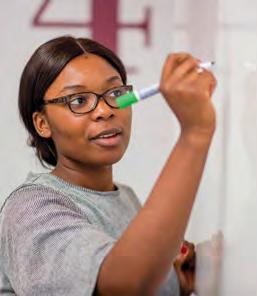
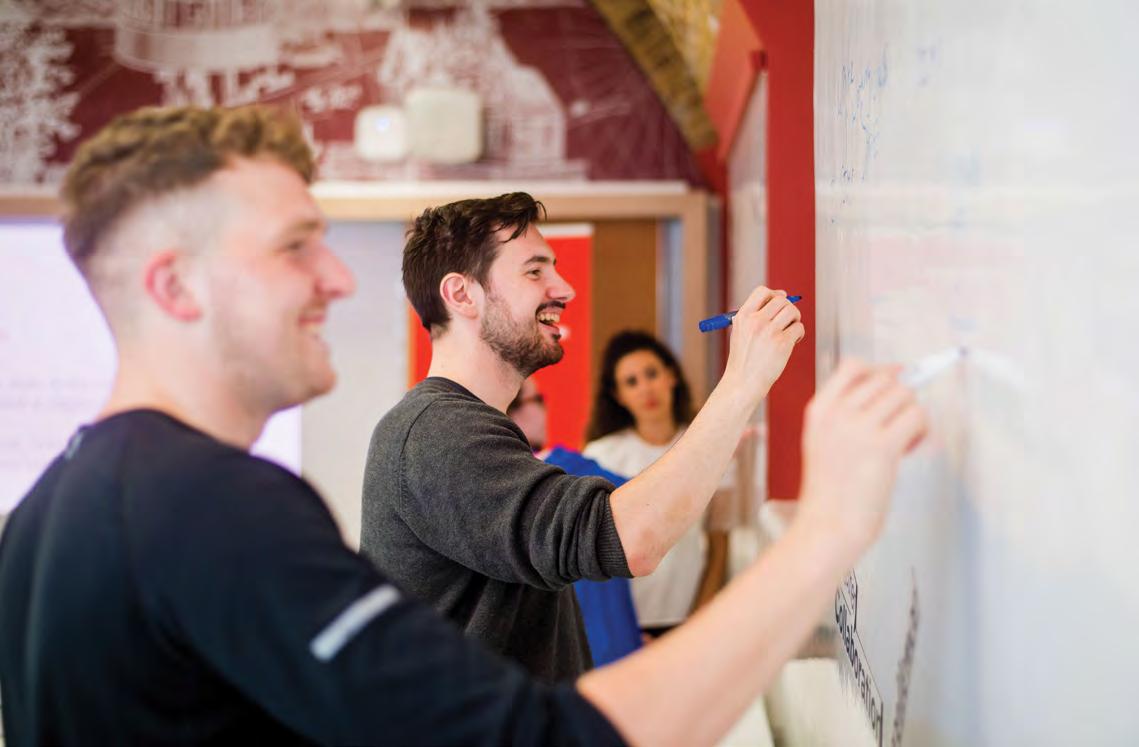
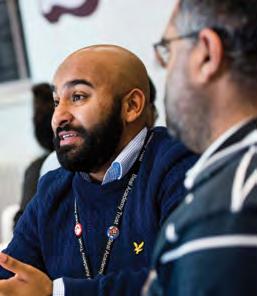
‘As a result of the King’s Advocate Award, I have been able to make solid links between school and King’s College London.’
‘Myself and many more are aware of routes to higher education as a result of attending the King’s Advocate Award training sessions.’
‘From being part of the King’s Advocate Award I am now more aware and more motivated in regards to widening participation.’
2016–17 King’s Advocates
22 teachers (PGCE, Schools Direct and Teach First) 14 researchers in schools 20 frontline social workers (cohort grown by 52% since 2015) 31
School Governor Network
School governors provide an important contribution to the strategic oversight of a school. King’s College London is committed to offering support and guidance to the school governor community within its staff body through the School Governor Network.
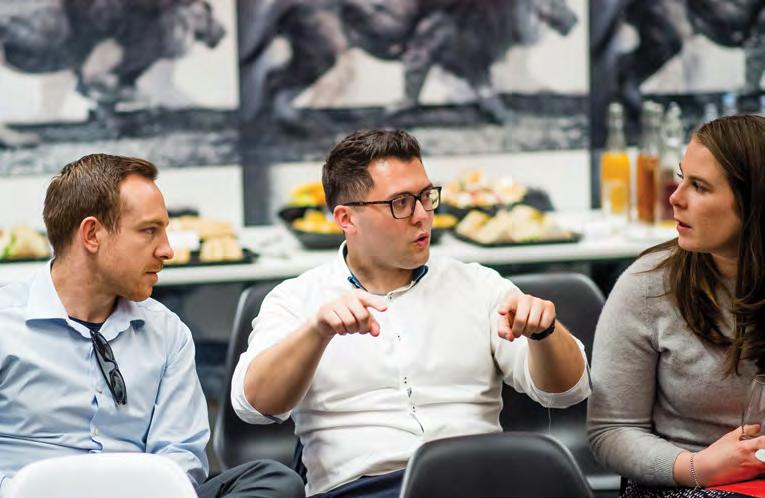
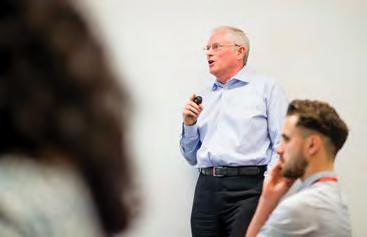
We are proud to offer members of the School Governor Network a series of continuing professional development opportunities designed to inform our governors about key issues affecting widening participation learners in their schools and colleges. Our innovative training sessions cover important topics such as the changing policy landscape in education, social mobility and school governance, parental and community engagement, as well as an Ofsted masterclass at the outstanding-rated King’s Maths School.
School Governor Network members are also encouraged to invite colleagues on their governing bodies to attend to ensure best practice is shared and undertaken in a range of schools where King’s staff have a governing presence.
Annual membership of The Key for School Governors is purchased for all members to enhance their professional development as a governor. King’s governors receive webinar
training on how to make the most of this online resource to access a significant bank of high quality information and further their understanding of topics covered within the Network’s training calendar.
In collaboration with School Governors One Stop Shop (SGOSS), the School Governor Network also provides information and guidance to King’s staff who are interested in becoming a school governor throughout every stage of the application process, and new and experienced governors have the opportunity to attend additional training opportunities led by SGOSS throughout the year.
We are excited to have grown the School Governor Network cohort to 45 staff members in 2017 and look forward to further developing and growing our governor community in the years ahead.
32
King’s College London Mathematics
School in the heart of London is a specialist state-funded school for gifted mathematicians aged 16 to 19, run in partnership with King’s College London.
One of the founding visions of the school was for it to be a centre of excellence for the teaching and learning of Mathematics. To realise this vision, we run extensive programmes and events for both students and teachers, and interest in these programmes has grown year on year.
GCSE enrichment for students
The enrichment programme for students in Years 10 and 11 enabled 200 pupils from under-represented groups to visit once a fortnight throughout the year. In these sessions, students have been challenged to think more deeply about the mathematics they have learned at school, and to develop a deeper and more connective understanding of the subject. The programme supports its participants in preparing for A-level study of Mathematics and Further Mathematics.
Mathematics Summer School
128 students from non-selective state schools, including those who have reached the end of Year 10 on the enrichment programme, came together for a week-long summer school. During the week students explored the algebra-geometry link and stepped into the
PROGRESS AND ACHIEVEMENTS
MATHS SUMMER SCHOOL
128 attended the Maths Summer school from 42 different schools
99 % improved their text scores between the start and the end of the week
world of Further Mathematics. Mathematicians visited the summer school to talk about their work in particular fields, including biology, computer science, economics and social science.
SEVEN+
This year for the first time, the Outreach team ran a three-day revision course for the new Mathematics GCSE aimed at high-attaining students in Year 11. 120 students from under-represented groups attended the course held at King’s College London and had extensive opportunities to polish their mathematical skills. A key aim for the course was to develop skills in problem solving, the challenging new focus of the recently refreshed Mathematics GCSE.
PHYSICS+
This week-long Physics Summer School was for Year 11 pupils intending to study Physics in the sixth form and had either studied double science GCSE or were from groups that are currently under-represented at A-level Physics. Students were lucky enough to experience a snippet of university life, attending academic lectures and using undergraduate laboratories.
King’s College London Mathematics School also runs a year-long teacher CPD course for A-level Further Mathematics teachers, termly forums for teachers, a Mathematics circle and a weekly Maths challenge.
96 % were more likely to study A-Level mathematics at the end of the week
239 participated in GCSE enrichment
SEVEN+
120 attended SEVEN+ revision sessions
100 % said the SEVEN+ had improved their skills and knowledge required for GCSE maths
PHYSICS+ SUMMER SCHOOL
85 participated in the Physics Summer School
99 % would recommend the course
33 King’s College London Mathematics School
Academic case study
‘I enjoy reassuring and informing, and helping people prepare for this transition to higher education.’
Jane Henderson, Senior Lecturer in Law, The Dickson Poon School of Law
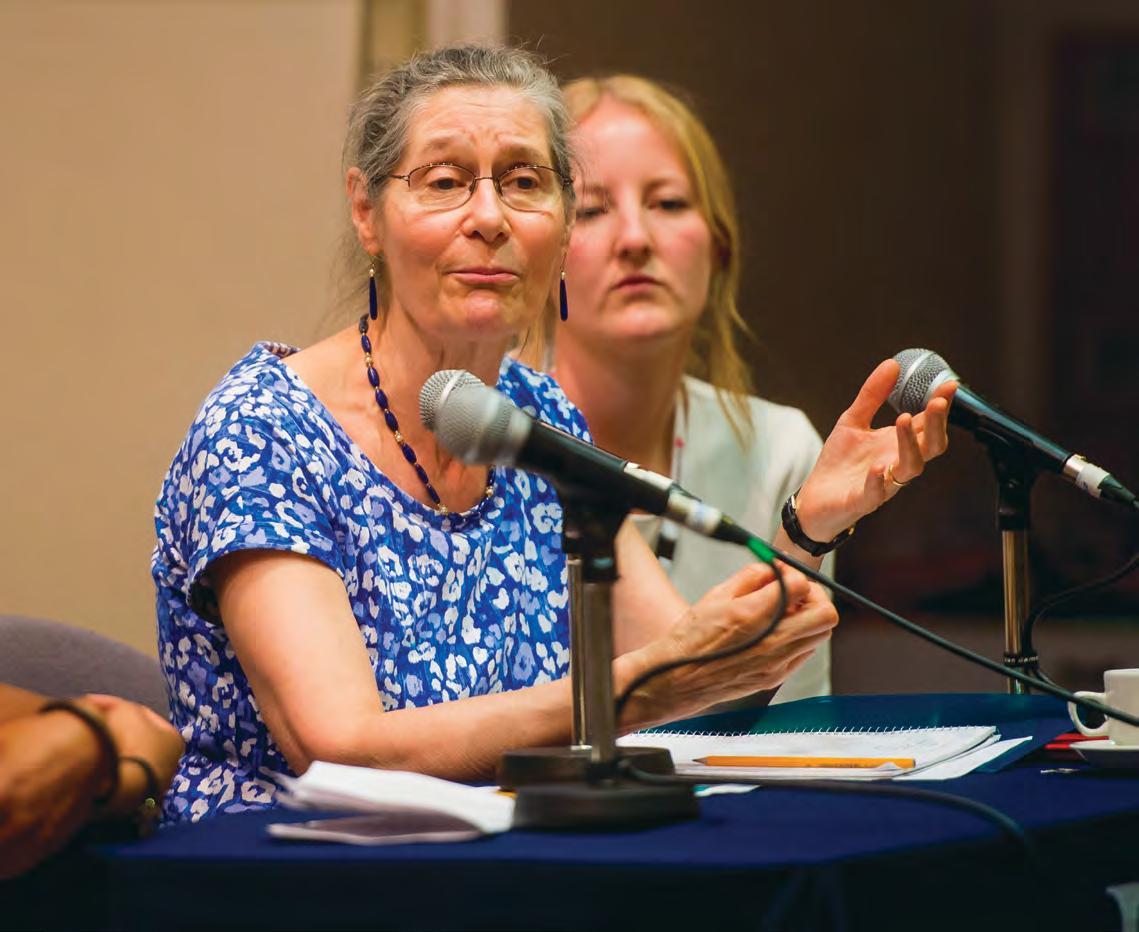
Widening participation is, and always has been, important to me. When David Caron became Law School Dean in 2013, I met with him to discuss work roles. He said ‘Whenever I talk to people about widening participation, your name comes up, so how about you become Widening Participation Coordinator?’ Perfect!
But why? Well, I really like people, I like myth busting and it bothers me that some young people’s range of life choices might be limited by a combination of circumstance and ignorance. I am aware that my job meant my own children grew up familiar with ‘University’; after a breakdown in childcare arrangements at one time or another each had sat in on one of my classes. Other people are not so lucky. If no one in the family or immediate network ever went to university, then so many aspects are really scary, from the admissions process to ‘what will it be like?’ and ‘is it worth it?’. I enjoy reassuring and informing, and helping people prepare for this transition to higher education.
Practically speaking, I annually act as King’s Arts and Humanities moderator for Realising Opportunities; help
coordinate Academic Days for the K+ Law Stream; find volunteers for the Sutton Trust Summer School (and give presentations myself); and find volunteers for The Brilliant Club. I also host some school visits, and this year was on the panel at the King’s Scholars’ family day. Here I explained the importance of university to almost 100 parents of underrepresented pupils, sharing my own experience in addition to providing advice. Finally, I was also made into a cartoon! As part of filming for Gameplan.ac.uk, one of my lectures was made into an interactive game for Key Stage 3 learners, featuring me as an animated character.
All this takes time. I recently calculated I spend more time on Widening Participation (WP) activities than giving seminars in the optional module I run. But for me, WP is fascinating and fun. I relish putting myself in the shoes of my audiences and being sensitive to misapprehensions, so that I can overcome them and encourage university applications from unrepresented students. ’
34
As part of King’s commitment to working collaboratively with social enterprises the Widening Participation Department has sponsored IntoUniversity’s Lambeth centre.
IntoUniversity is an education charity which, through its local learning centres, promotes aspiration amongst disadvantaged young people. The charity works with primary schools, secondary schools, and sixth forms to deliver a programme of workshops which are designed to encourage ambition and enhance attainment. From its local centres, IntoUniversity provides learning and homework support, as well as a mentoring scheme which sees its students paired with undergraduate and corporate mentors.
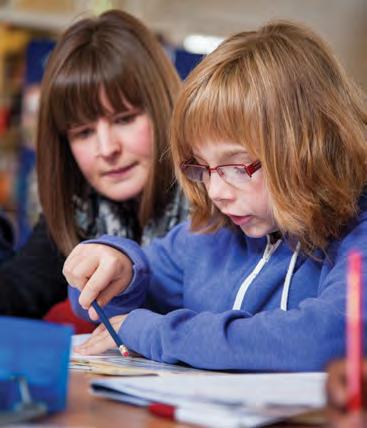
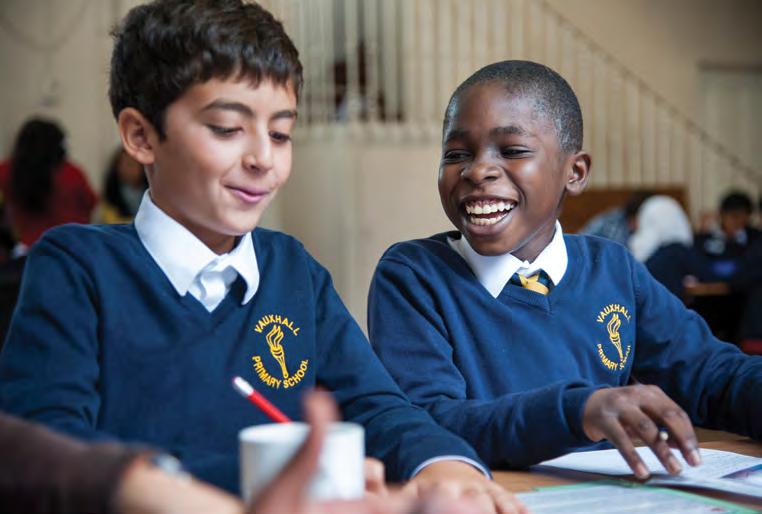
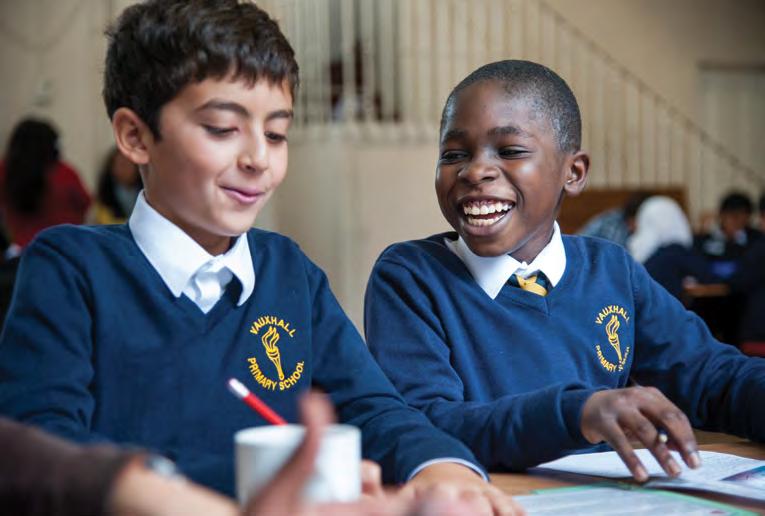
Each year IntoUniversity Lambeth will work with 900 local students from the ages of 7 to 18, both in school and in their centre. These students will have the opportunity to engage with an array of age-appropriate interventions which range from discovering what a university is in Year 5, to experiencing an exciting business simulation in Year 9 and personal statement support in Years 12 and 13.
King’s will continue to support the wider charity through hosting Primary FOCUS graduations and Buddy Days. Over the
course of 2016–17, 28 such events were held at the university, including mentor training and various holiday programmes.
IntoUniversity also support students once at university. In partnership with investment firm Blackrock, during the summer 170 of the charity’s Year 13 students participated in the Big City Bright Futures internship scheme, which entailed a week-long bootcamp at King’s.
35 IntoUniversity
Outreach in Wales
King’s College London is part of the SEREN network, a series of regional hubs designed to support Wales’ brightest sixth-form students achieve their academic potential and gain access to leading higher education institutions.
SEREN was set up to address the low progression rates of Welsh pupils to top selective UK universities. Since 2015, King’s has supported the Education Achievement Service (EAS) SEREN hub, which covers south-east Wales, through delivering
The Brilliant Club
The Brilliant Club is a non-profit organisation that recruits, trains and places PhD students in schools to deliver programmes of university-style tutorials. The organisation connects researchers from top universities with students who have demonstrated academic potential from challenging schools.
The Brilliant Club’s tutorial programme is designed to challenge students and prepare them for higher education as well as affording students the opportunity to develop their skills, confidence, and ambition. A significant number of PhD researchers from King’s have been involved in leading these programmes, which commence with a launch event at a university and, after the students have completed an academic assignment, conclude with a graduation ceremony.
information, advice and guidance sessions in schools as well as sending researchers to facilitate academic taster sessions.
For some Welsh students, not having the opportunity to travel beyond their local area can be a barrier to accessing leading UK universities. To address this, King’s invited EAS hub schools to send students to a summer residential event, during which they experienced a programme of academic workshops across four different subject streams and gained an insight into university and London life.
Throughout 2016-17 King’s worked alongside The Brilliant Club to host 14 launch and graduation events on campus.
Since 2014, The Brilliant Club and the Widening Participation Department have partnered on the K+ Spotlight Summer School to deliver a series of tutorials as part of the K+ scheme. The Brilliant Club recruits and trains 14 PhD tutors each year to deliver an engaging and challenging intensive course over the five-day summer school. After the summer school, students complete an assignment which is marked to university standard and are given detailed individual feedback to support their academic development.
In July 2017 King’s hosted and co-created The Brilliant Club’s annual conference which explored the latest insights in widening participation across the whole student life cycle.
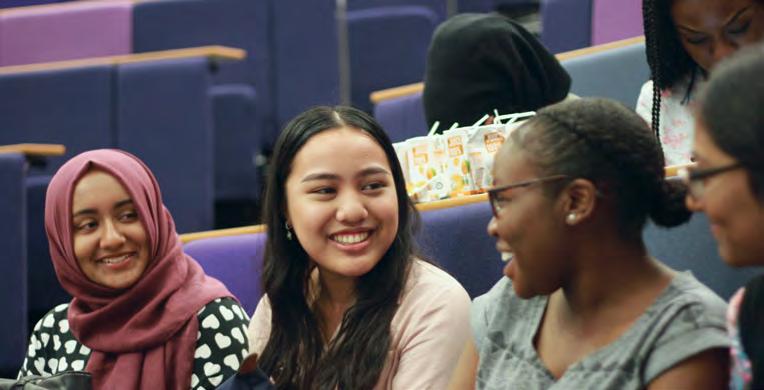
36
King’s recognises that diversity is strength. We want our university to be truly reflective of the community it serves. We also accept that we have some work to do to achieve this goal.
While the 2011 Census put the blackCaribbean population in London at 4.2 per cent, representation of black-Caribbean students at undergraduate level is far lower at one per cent. In order to address this, the Widening Participation Department are making a series of interventions, including partnering with the Amos Bursary on an annual event and a scholarship opportunity to be launched in 2017–18.
The Amos Bursary charity challenges, inspires and develops talented British students of African and Caribbean descent, who have excelled at school and are motivated to make a positive impact on society. It prepares them to face the challenges which lie ahead, and aims to ensure that participants are well rounded individuals, fully equipped to make informed and appropriate choices which will shape their futures. It also prepares them for university, for work, and to become ‘real’ models in their communities.
The Amos Bursary selects young men at the age of 16 (Year 12) and they are on the programme for the duration of their time at university. Over those five years they participate in intensive programmes of
personal and professional development, which include having both a peer and professional mentor, attending motivational events and networking opportunities, coaching and a £500 annual bursary to support them while they study.
This academic year, we are proud to build on our partnership with Amos Bursary by introducing a scholarship for black-Caribbean boys. Candidates must have applied to study an undergraduate degree at King’s College London and meet the full eligibility criteria. Applicants do not have to be a current Amos Bursary recipient to apply, but must make an application online through the Amos Bursary website. If successful, candidates will be invited to join the programme, as well as receive £1000 a year from King’s throughout the duration of study. For further details, please contact kate.kettle@kcl.ac.uk
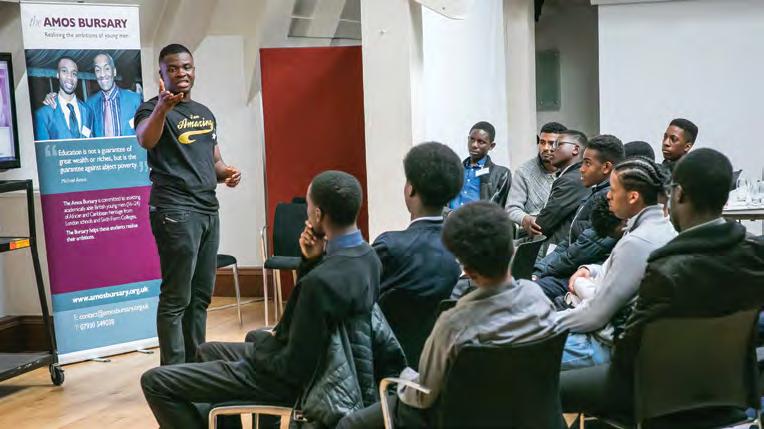
In April 2017, King’s College London WP were delighted to host a conference in partnership with Amos Bursary. Here is what Franklin, an Amos Bursary holder, had to say about the event:
‘The Amos Bursary two-day conference at King’s College London has been full of laughs, cheers, great food and most importantly crucial networking opportunities and life changing advice… The new skills and knowledge attained from the conference I believe are transferable to every aspect of my student and future working life and I really anticipate the future now as a much more proud and confident young black student instead of fearing it. It really was not an event to be missed.’

37
BAME outreach
Penguin Random House
Penguin Random House is one of our key corporate supporters. The publishing company has been involved in developing the careers and employability skills of our students as well as helping our students to rediscover their love of reading.
Our post-16 Book Club has been sponsored by Penguin Random House since 2015. The Book Club provides the 101 members with a free book each month and grants the students an opportunity to meet the authors behind the books.
Book Club members have been treated to conversations with authors such as Gavriel Savit, author of Anna and the Swallowman, Emily Barr, author of The One Memory of Flora Banks, and British author and screenwriter Catherine Johnson.
The K+ Languages and Literature stream have also benefited from careers visits to Penguin Random House during which they have gained an insight into what working in publishing is like. They also had the chance to quiz colleagues from a range of departments, some of whom are only a couple of years older than the students and have just entered the working world.
‘The idea of coming from South London as a second-generation immigrant to pursue higher education seemed like something completely out of my reach – that is until I started the K+ programme. On the programme I was able to build my confidence in my intellectual integrity as well as my personal outlook on university and the terrifying ‘Future’.
Once I was accepted into King’s, I was determined to become a WP student ambassador so that I could give back to the programme. One of my first jobs was to assist on a careers day for the new K+ cohort. Here, I discovered the Penguin Random House work experience scheme. I applied and after my second attempt was given a slot over the summer working with the Children’s Marketing and Publicity team. They were super friendly and open to answering the many questions I had about the industry and their own journey into publishing. I gained a lot of knowledge in the field and it sparked me to start my own blog as well as a possible career in publishing once I graduate.’
Chloe Lam, K+ Graduate, 2nd year English Language and Literature student, King’s College London
K+ graduates have also experienced the careers support provided by the publishing company as demonstrated by King’s English student and K+ Graduate Chloe Lam who obtained a work experience placement with Penguin Random House in August 2017 as a result of her involvement with K+.
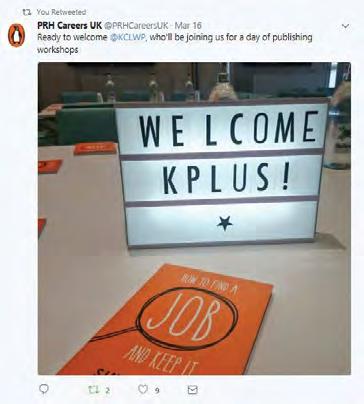
‘We think it’s important to work with K+ students as this is such a key time in their lives, a time when they’re thinking about their careers and where their story might take them.
As a business, we also want to make publishing more inclusive and less mysterious. Sharing how a book reaches readers, or how a great book becomes a popular audiobook, app or Netflix series, is important as it might inspire the next brilliant publisher.
The careers day gives the students a taste of the exciting variety of different departments involved in publishing and lets them try these different roles on for size, hopefully, leaving them inspired by the possibilities.’
Alex Watson, Penguin Random House UK
38
There are many ways in which you can work with us to support more young people from under-represented backgrounds to access highly selective institutions and succeed in their studies. Please contact us on outreach@kcl.ac.uk for further information about the opportunities below or to join our WP mailing list. Follow us on Twitter and Instagram @KCLWP to keep up to date with our work.
King’s College London staff
We believe every member of staff at King’s has an important role to play in widening participation at our university and in wider society. Staff can get involved in a number of ways.
Becoming a school governor provides an opportunity to contribute to the strategic direction of a school in your local area or Greater London. The School Governor network at King’s gives comprehensive support to those undertaking or considering the role.
The WP Grant Scheme provides support to widening participation initiatives using the expertise of King’s staff. It provides funding for activities that can demonstrate an ability to contribute to the university’s widening participation strategy and aims. In addition to financial support, bid holders will receive support from the Widening Participation Department to deliver activity, including support with evaluation, in engaging schools and young people, and the use of space for activity on campus.
Staff can also attend our termly open forums or lead a workshop for our students.
Students
Students are key in widening participation at King’s. Students can apply to join the ambassador programme in September and help us raise awareness of higher education through sharing their university experiences. PhD students often lead short courses for our programme participants and supervise their academic assignments, helping prepare them for university study. We also work closely with KCLSU to support student-led outreach and societies. Volunteers can contact the KCLSU WP coordinator to get involved.
Alumni
King’s alumni have the power to inspire and open doors for widening participation learners. There are plenty of opportunities to support them including mentoring on King’s Connect, being a guest or a speaker at an event or by brokering a collaborative relationship between our department and your employer.
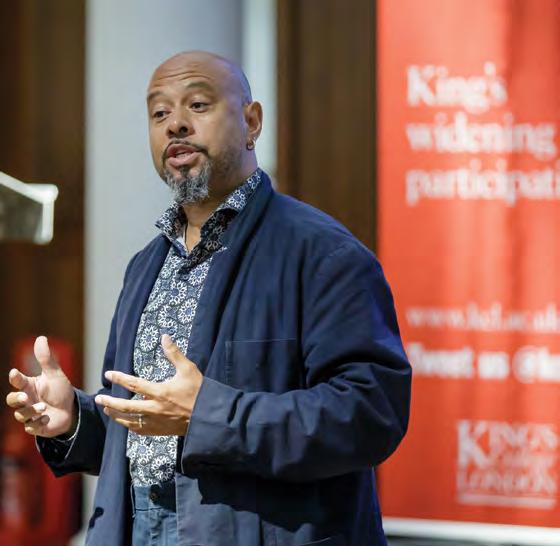
Parents and guardians
We are supporting our parents to create better access to university for their children. Parents of King’s Scholars can join with the 100 King’s Scholars parents already involved in Parent Power. Peer parent networks are powerful and have already benefited from a visit to the University of Oxford. We are also looking for parents to share their story with other families to encourage them in their journey supporting their child to progress to higher education.
Corporate supporters
We are proud of the support and sponsorship provided by our key corporate supporters and sponsors. Opportunities to support our work include hosting visits and careers days, providing work experience placements for students and sponsoring our programmes.
Opportunities to get involved
39
Acknowledgements



The activities and programmes delivered through the Widening Participation Department are made possible through the support, partnerships and collaborations of individuals, businesses and charitable organisations.


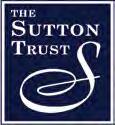
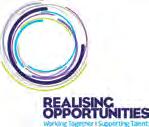
We would like to thank the following departments, organisations and individuals for their contribution towards widening participation at King’s over the last year.
Partners

40
Key supporters
Article 26
Amos Bursary
Barclays
The BE Group
Behavioural Insights Team
Bloomberg
The Brightside Trust
The Brilliant Club
British Dental Association
British Museum
Buttle UK
Calverts
Champion Agency
Citizens UK
The Courtauld Gallery
Drive Forward
Fair Education Alliance
FixUp
Florence Nightingale Museum
Frontline
Future Leader’s Magazine
Gowling WLG
International Space School Education Trust
James Aidoo
JOLT International
Just For Kids Law
The Key for School Governors
Keystone Aspire
King’s Archives
King’s Careers and Employability
King’s Commercialisation Institute
King’s Cultural Institute
King’s Health Partners
King’s Modern Language Centre
Learning Performance
LKMCo
Maggie Alphonsi MBE
Mayer Brown
Michael Dapaah
Museum of London
National Centre for Citizenship and Law
National Maritime Museum
Penguin Random House
Powerful Media
Researchers in Schools
Reach Society
Royal Courts of Justice
Royal Observatory
Roche
On Purpose
Science Gallery London
SGOSS
The Shakespeare Globe Trust
Small Axe
Southwark Law Centre
Supreme Court
Splinter Design
Student of Life
Steve Beckles-Ebusua
Teach First
The Champion Agency
Tougher Minds
Unite Foundation
upReach
Wellcome Collection
Worshipful Company of Barber’s
Worshipful Company of Bowyers
41
Meet the team
To email a member of the team please email (first name).(last name)@kcl.ac.uk.
The Widening Participation Department continues to grow as we develop new programmes and deliver our full lifecycle model. We would love to hear from anyone who is interested in finding out more about our work or getting involved.
Anne-Marie Canning
Anne-Marie provides institution-wide leadership for social mobility and student success. She is responsible for strategy and services underpinning widening participation, transition and retention, student communications, events, engagement and success.
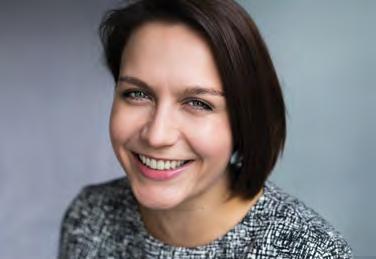
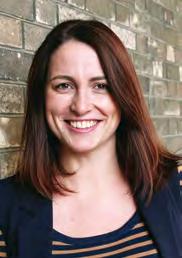
@amcanning
Anne-Marie Henderson
Anne-Marie is responsible for advising and coordinating the university-wide support for vulnerable students with the transition to university and whilst on course.
This includes but is not limited to care experienced, estranged and forced migrant students.
Billy Reed
Billy is responsible for the department’s work with pre-16 students and has oversight of the widening participation grant scheme and the department’s evaluation work.
@kcl_billy
Effy Alexandrou
Effy is responsible for the development and delivery of the King’s Scholars programme in Years 6 and 7.
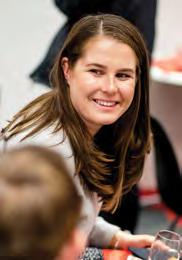
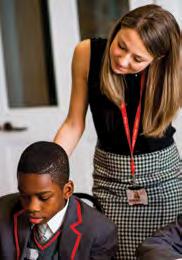
@effy_kcl
Eleri Burnhill
Eleri leads on areas of research and evaluative analysis to inform the development of widening participation strategy and operation at King’s College London.
@eleri_burnhill
Jack Mollart-Solity
Jack leads on supporting and advising students who may face challenging circumstances when accessing university. He also manages the Realising Opportunities programme at King’s.
@jackms_kcl
James Pickering
James oversees K+, manages and evaluates the team’s delivery of events and activities for students on the programme. He also takes an active role in the admissions process for WP students.
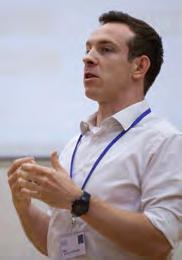
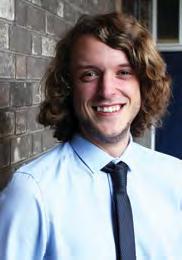
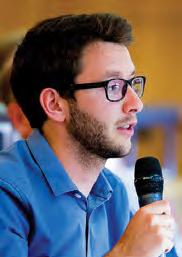
@jimmypeanuts
Jo Marchant
Jo manages the relationship with some of our key partners, such as the Brilliant Club and IntoUniversity. She also manages our visits to schools and colleges.
@kcl_jo
42
Top row, left to right: Anne-Marie Canning, Anne-Marie Henderson, Billy Reed. Above, left to right: Jack Mollart-Solity, Eleri Burnhill, James Pickering, Eftyhia Alexandrou.
Joe Collin
Joe is responsible for Years 8 and 9 of the King’s Scholars Scheme, Gameplan.ac.uk, the department’s strategy on parental engagement, and new projects on white working class boys and metacognition.

@joecollin2
Kate Kettle
Kate holds responsibility for the BAME strategy, financial monitoring and fundraising within the department, as well as sitting on numerous committees and boards.
@katekettle
Kate Morgan
Kate is responsible for the development and delivery of Outreach for Medicine off-campus events in primary and secondary schools across Greater London.
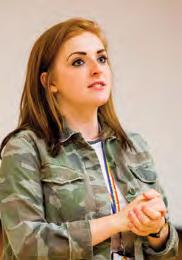
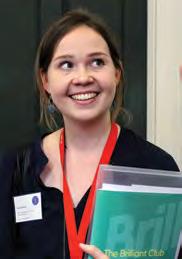
Kirsty McLaren
Kirsty is responsible for the development and delivery of the Dental Outreach programme. She also manages the Sutton Trust Summer School programme at King’s.
@kirsty_kcl
Maija Koponen
Maija is responsible for developing and delivering targeted support for WP students studying at King’s. She also led on the behavioural insights project.
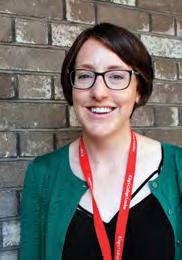
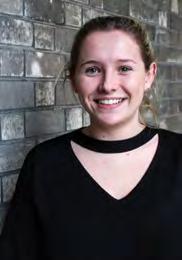
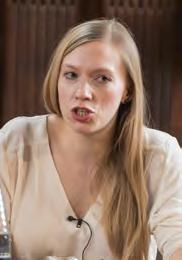
@maija_koponen
Michaela O-Connell
Michaela is responsible for the development and delivery of Outreach for Medicine on-campus activities; she is also greatly involved in King’s Extended Medical Degree Programme.
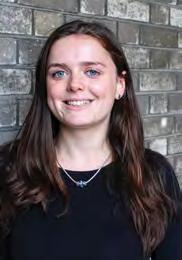
@michaela_ocon
Syreeta Allen
Syreeta is responsible for the department’s work with post-16 students and has oversight of the special admissions process for widening participation students and the department’s strategic communications.
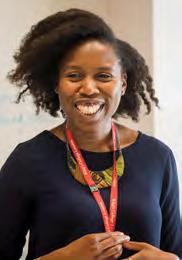
@syreeta_kcl
Tom Weaver
Tom manages the King’s Advocate Award. He also runs the School Governor Network, supports on the K+ programme and manages the department’s e-mentors and student ambassadors.
@tom_kcl
Zu Mayet
Zu is responsible for the administrative support for the post-16 team as well as acting as a central point of contact for enquiries in the Widening Participation Department.
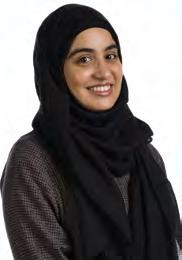
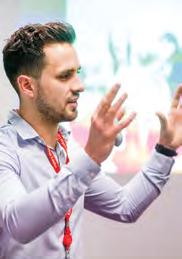
43
Top row, left to right: Jo Marchant, Zuleka Mayet, Michaela O’Connelll, Tom Weaver, Kirsty McLaren. Above, left to right: Kate Kettle, Joe Collin, Maija Koponen, Syreeta Allen, Kate Morgan.
Widening Participation Department
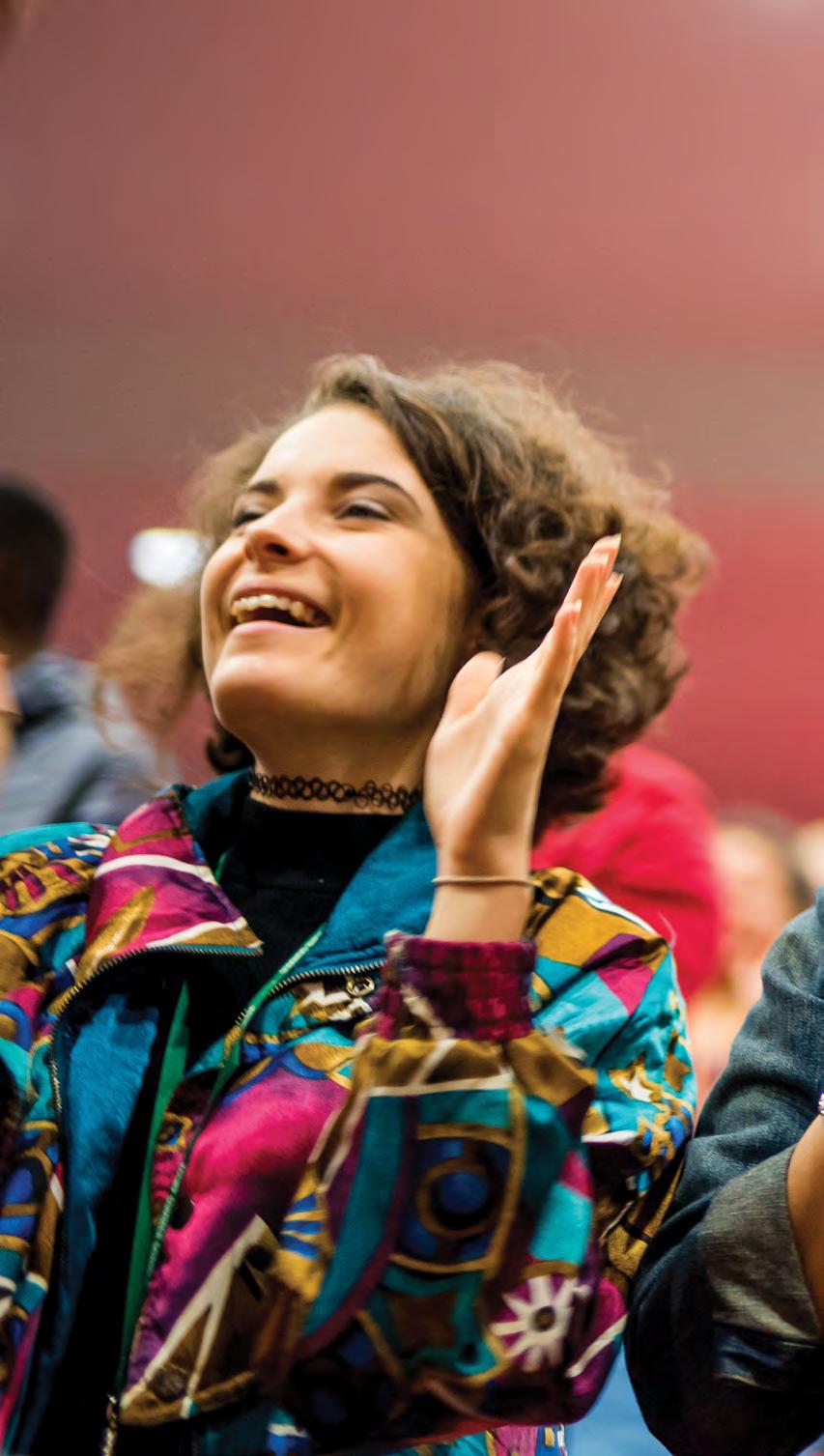
King’s College London Room 4.18
James Clerk Maxwell Building 57 Waterloo Road London SE1 8WA
+44(0) 20 7848 4132 www.kcl.ac.uk/wp outreach@kcl.ac.uk
@kclwp
w ww.facebook/kclwp
w ww.kclwp.tumblr.com
w ww.flickr.com/photos/kclwp
w ww.vimeo.com/kclwp
Designed by: Calverts www.calverts.coop
Approved by brand@kcl.ac.uk
November 2017
Photography by: David Tett, Nick Miners, Isabel Infantes, Nathan Clarke, Tim Ireland and John Cairns
Page 5 icon bottom right created by: Luis Prado from the Noun Project
Back page K+ ad: The Champion Agency
Printed by: SLS Print
44
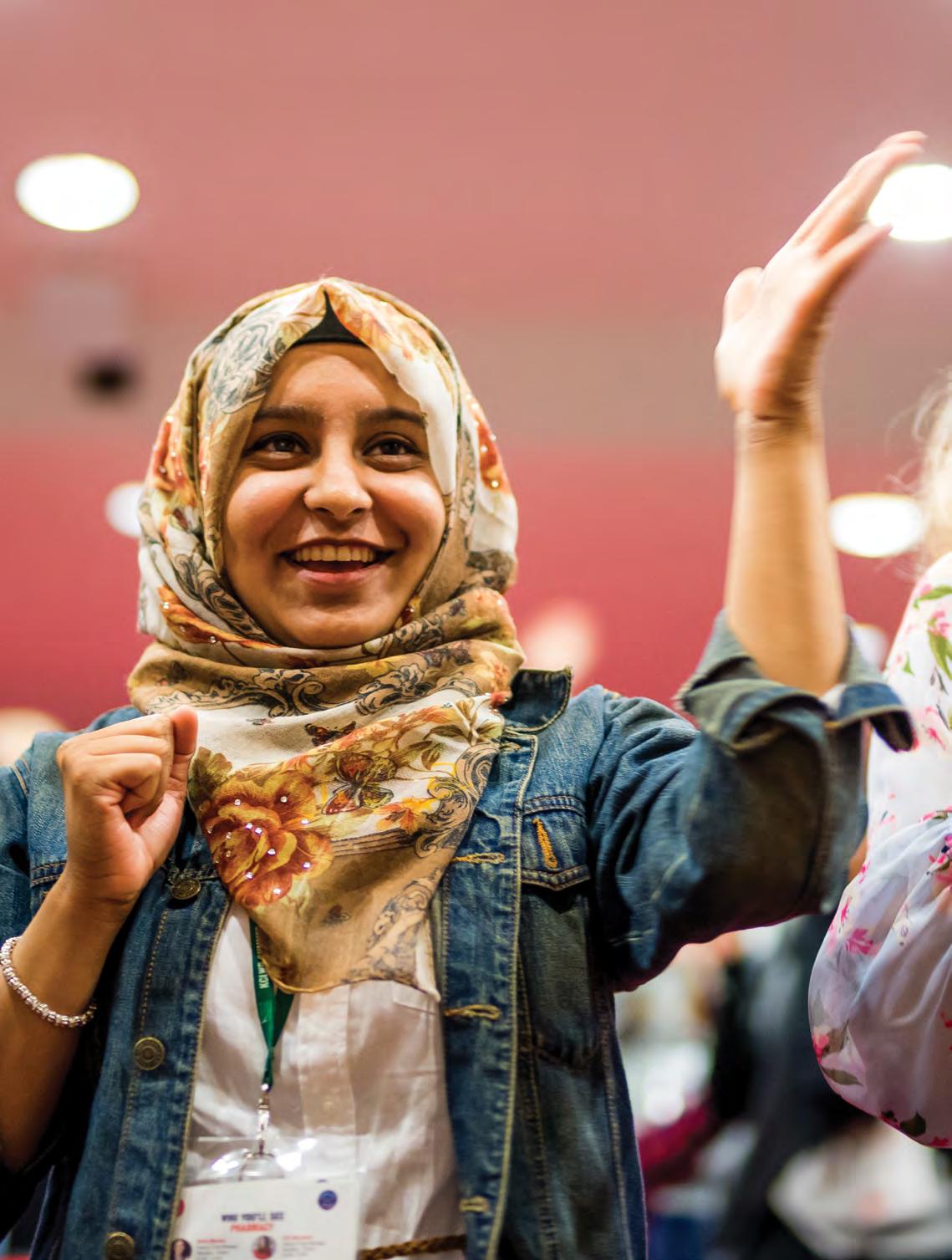
45
The smart way to get to university
K+ is a completely free two-year programme of mentoring and activities to enable bright Year 12 students to realise their university potential. Completion of the programme unlocks a variable offer to study at King’s.
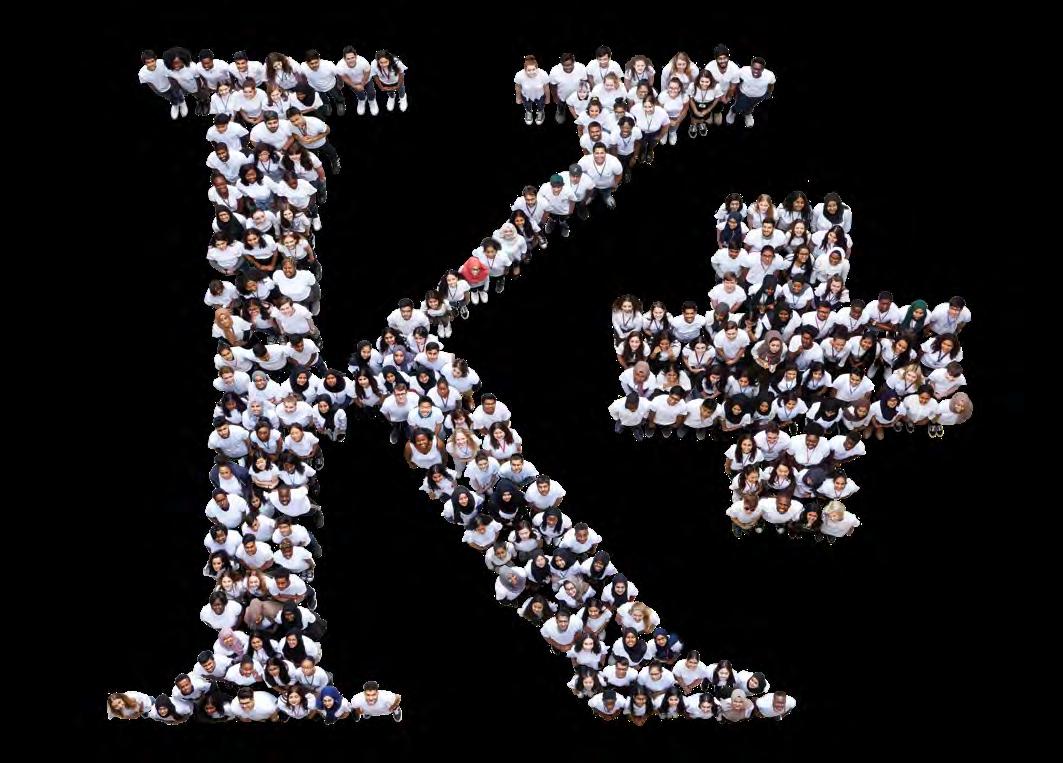
Deadline: 11 October
Apply now: kplus.london @kclwp
K+ class of 2017
Join us, London
#kpluslondon
/kclwp

















 Simon Pedley, Post-16, Progression and More Able Advisor, Ormiston Academies Trust
Simon Pedley, Post-16, Progression and More Able Advisor, Ormiston Academies Trust






























































